Undergraduate
2026 | STUDY GUIDE

1 NO. in QLD for full-time employment1
5 STARS for student teacher ratio1
1 NO. in QLD for regional, rural and remote health professionals2





2026 | STUDY GUIDE

1 NO. in QLD for full-time employment1
5 STARS for student teacher ratio1
1 NO. in QLD for regional, rural and remote health professionals2




Education is the cornerstone of our shared future. It deepens our understanding of the world, equips us with the skills to make meaningful contributions, and helps us grow into individuals who can shape a brighter tomorrow. More than just opening doors to fulfilling careers, education empowers us to dream, explore, and engage with new ideas. It invites us to make lasting connections and have fun along the way.
At James Cook University (JCU), we are committed to making education all of these things – and more. We are dedicated to providing you with an exceptional student experience that combines academic excellence with real-world application. What sets JCU apart is the unparalleled opportunity to engage with nature and society in ways that are deeply authentic. While pursuing your studies, you can explore the wonders of the Great Barrier Reef, the incredible Daintree Rainforest, and the vast Australian outback – all while learning in your own backyard.
Our unique location allows you to interact with regional and remote communities, use ecosystems as living laboratories, or work in areas confronting the realities of climate change and the power of nature. This is education that goes beyond textbooks and classrooms. This is JCU – Uni, but not as you know it.
For over 50 years, JCU has been at the forefront of creating a brighter future through education and research that makes a genuine difference. We are dedicated to experiential learning, bringing together the natural world, built environments, and human societies to address real-world challenges. Our commitment to sustainability is grounded in our mission to support the United Nations’ Sustainable Development Goals.
As you explore this guide, take a moment to imagine the possibilities that await you here. Whether you choose to study in one of the most extraordinary natural environments in the world or from the comfort of your own home, our goal is to provide you with an education that is life-changing. You’ll develop the skills, knowledge and confidence needed to launch a fulfilling career – and more importantly, to make a meaningful impact on the world around you.
In times of uncertainty, education is more vital than ever. It strengthens communities, enhances resilience, and opens doors to new opportunities.
Thank you for considering JCU. We look forward to supporting you on your journey and working together to create a brighter future.
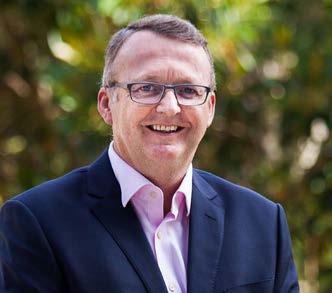

President
SEMESTER DATES 2026
SEMESTER ONE 2026
Applications close 15 February*
Orientation (O Week) 16–20 February
Semester begins 23 February
Enrolments close 1 March
SEMESTER TWO 2026
Applications close 15 July*
Orientation (O Week) 20–24 July
Semester begins 27 July
Enrolments close 2 August
TRIMESTER DATES 2026
TRIMESTER ONE 2026
Applications close 9 December 2025*
Orientation (O Week) 19–23 January
Trimester begins 27 January
Enrolments close 1 February
TRIMESTER TWO 2026
Applications close 11 May*
Orientation (O Week) 11–15 May
Trimester begins 18 May
Enrolments close 24 May
TRIMESTER THREE 2026
Applications close TBA September+
Orientation (O Week) 7–11 September
Trimester begins 14 September
Enrolments close 20 September
RESPECT. NOW. ALWAYS
James Cook University values and celebrates the diversity of our community, and is committed to ensuring our learning and working environment is safe and welcoming.
JCU is proud to be part of the Respect. Now. Always. campaign – a national initiative led by Universities Australia to highlight our determination to ensure our students and staff are safe from discrimination and sexual harassment. Further information about the campaign and free services available for students can be found at jcu.edu.au/sew
OUR COMMITMENT TO AUSTRALIAN ABORIGINAL AND TORRES STRAIT ISLANDER PEOPLES
James Cook University is committed to building strong and mutually beneficial partnerships that work towards closing the employment, health and education gap for Australian Aboriginal and Torres Strait Islander peoples.
Our students come from many backgrounds, promoting a rich cultural and experiential diversity on campus.
We acknowledge the Aboriginal and Torres Strait Islander peoples as the Traditional Custodians of the Australian lands and waters where our staff and students live, learn and work. We honour the unique cultural and spiritual relationship to the land, waters and seas of First Australian peoples and their continuing and rich contribution to James Cook University (JCU) and Australian society. We also pay respect to ancestors and Elders past, present and future. Aboriginal and Torres Strait Islander peoples are advised that this publication may contain names or images of people who have passed away.


Study in a unique environment where natural wonders and a vibrant on-campus experience come together.
Townsville is on the coast of North Queensland, approximately halfway between Brisbane in the south and Cape York at the state’s most northern tip. To the east is the Great Barrier Reef, with the Gulf Savannah region and many outback country towns to the west.
The region is home to national park reserves, sandy beaches, rugged outback adventures, quaint coastal townships and a wide range of other attractions. Locals make the most of the great outdoors through rainforest hikes, mountain biking and snorkelling or scuba diving on the Great Barrier Reef.
JCU recognises the Bindal people as the Traditional Owners of the land they call Thul Garrie Waja, where the campus now stands in the southern suburb of Douglas.
The Indigenous name given to this campus is Bebegu Yumba, which means ‘place of learning’ in the Birri-Gubba language spoken by the Bindal people.
JCU Townsville is a teaching and research hub with facilities and resources to support your learning.
• Eddie Koiki Mabo Library – An architectural icon, the library houses special collections relevant to North Queensland, research facilities and learning support services. It also showcases works by prominent Indigenous artists.
• Education Central – This design award winning student centre features technology-enhanced and flexible learning spaces. It supports contemporary methods of learning and teaching to maximise your engagement, motivation and learning outcomes.
• Engineering and Innovation Place – The new centre gives you access to high-quality STEM (Science, Technology, Engineering and Mathematics) innovation, research and educational facilities. It joins the Ideas Lab in Cairns as the combined home for innovation and digital transformation at JCU.
• The Learning Centre – Offering free and confidential learning support, the centre supports your academic needs online and oncampus. It also hosts peer-assisted study sessions where you work with fellow students to expand your learning.
• JCU Science Place – A dedicated centre of excellence in science, it features modern teaching areas, research labs and technologyenabled active learning spaces. It was the first educational building in Australia to achieve a LEED® Gold rating for its environmentally sustainable design.
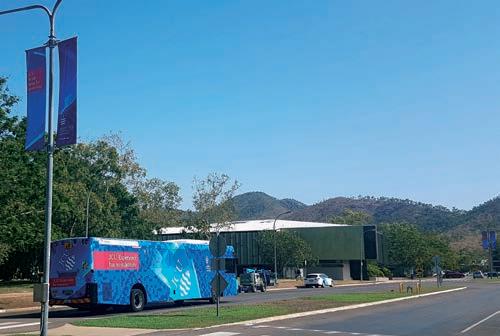
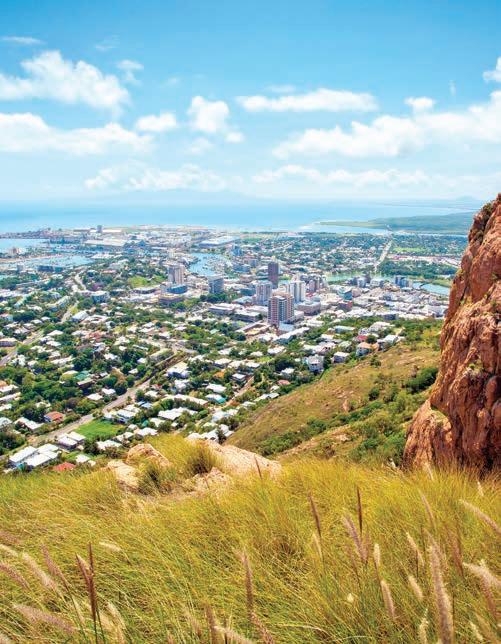
James Cook University (Singapore Campus) has achieved the highest level of accreditation from the Singapore Government, the EduTrust Star.
Modern Singapore is a constantly evolving city, at the forefront of global health, technology and economic advancement. It is home to a diverse population of Chinese, Malay, Indian and other ethnic groups, covering a wide spectrum of religions, cultures and languages.
Sitting at the southern tip of the Malay Peninsula, Singapore was first known as Pulau Ujong, meaning ‘island at the end’ in Malay. It was later called Temasek, possibly from the Malay word for ‘lake’ or ‘sea’, before becoming Singapura, a Malay name derived from Sanskrit meaning ‘lion city’ and anglicised as Singapore.
The Orang Laut are recognised as the indigenous peoples of Singapore. Their name comes from the Malay term ‘people of the sea’ reflecting their nomadic, seafaring way of life.
Students at James Cook University (Singapore Campus) enjoy the use of collaborative learning spaces and access to internationally renowned lecturers.
• Aquaculture Research and Teaching Facility – This new facility gives you access to support the development of expertise in tropical aquaculture in Singapore and the broader region.
• Centre for International Trade and Business in Asia (CITBA) – Created to share knowledge about economic development opportunities, CITBA is focused on the expansion of business and international trade in Asia.
• Learning Centre – This centre is dedicated to improving your learning outcomes and offers the support and guidance you need to succeed in your studies.
• Tropical Futures Institute – The Institute focuses on research in science, health and social sciences, particularly relating to aquaculture, healthy ageing and tourism within the Southeast Asian context.
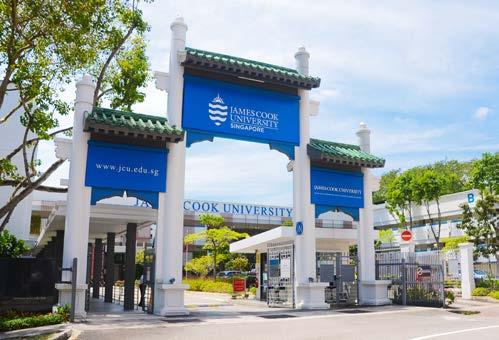
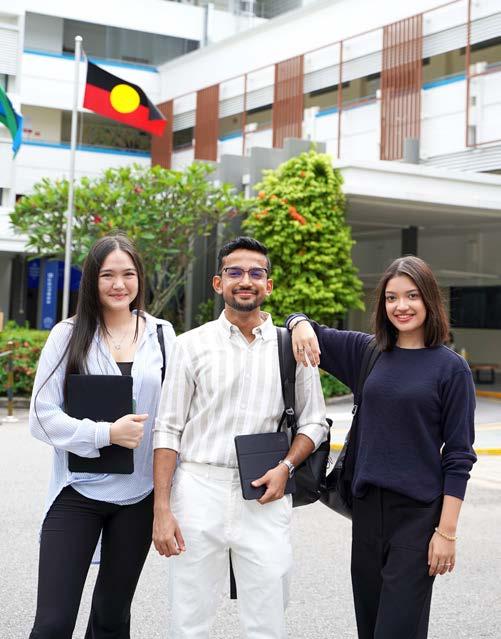
Learn in modern facilities at JCU Cairns, close to World Heritage listed natural environments.
Cairns is a tropical, multicultural city with modern art, music and theatre venues, hundreds of kilometres of walking and cycling tracks, bustling markets and plenty of beaches nearby. It’s a major tourist destination and base for exploring spectacular reefs, lush rainforests and rich cultures.
Located in Far North Queensland on the east coast of the Cape York Peninsula, the region is home to the Great Barrier Reef to the east, ancient rainforests in the Daintree National Park to the north and the Atherton Tablelands to the west.
JCU recognises the Yirrganydji and Yidinji peoples as the Traditional Owners of the lands where its Cairns campuses now stand, in the northern suburb of Smithfield and in Cairns city.
The Indigenous name given to the Smithfield campus is Nguma-bada, which means ‘belonging to tomorrow’, while the Cairns city campus is named Bada-jali, meaning ‘flowering of the cocky apple tree’, both from the coastal dialect of Djabugay spoken by the Yirrganydji people.
Enjoy dynamic learning environments at JCU Cairns with academic staff committed to your success.
• Australian Tropical Herbarium – Dedicated to protecting the survival and diversity of tropical plants, the herbarium houses more than 180,000 dried plant specimens.
• Dental Clinic – Supervised by experienced clinicians, the clinic gives you greater access to practical learning, treating real patients in routine care and complex dental treatments.
• eduQuarium – This educational aquarium supports research on aquatic organisms, natural history documentary filming and public access to view marine life and meet with JCU researchers.
• Electronic Moot Court – JCU’s e-courtroom at the Cairns city campus provides you with technology-enabled, active learning spaces and practical legal training in the latest methods of evidence management.
• JCU Ideas Lab – Built as a hub for teaching, learning and research, it supports you to bring ideas for new innovations to life. It was designed and constructed to meet the same LEED® Gold standards of JCU’s Science Place in Townsville.
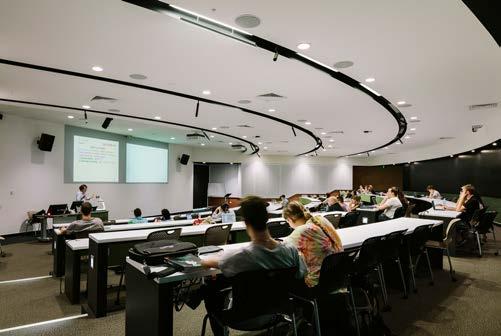

Enjoy a world-class education in Australia’s fastest growing capital city for employment.
Brisbane is the capital of Queensland and the third largest city in Australia. Nestled in the state’s southeast, it has the Sunshine Coast to the north, Gold Coast to the south, the Scenic Rim to the west and the sand islands of Moreton Bay to the east.
The winding reaches of the Brisbane River are a prominent feature of the landscape, as are hilly suburban pockets and extensive parkland areas. It’s a green city with a subtropical climate and diverse population.
JCU recognises the Turrbal people as the Traditional Owners of the area they call Meanjin, which may mean ‘place of the blue water lilies’ or 'place shaped as a spike', where the campus now stands in central Brisbane.
Europeans referred to the region and later settlement as Moreton Bay before declaring it the city of Brisbane.
Students in Brisbane can access dedicated services for academic learning, English language support and employment assistance.
• Learning Centre – A resource dedicated to help improve teaching practices and help you access guidance and support when you need it.
• On-campus services – Facilities include study spaces, comfortable student lounges, computer stations, internet and Wi-Fi, leisure and activity rooms.
• Resource Centre – You’ll have 24/7 online access to journals, ebooks, streaming videos, online tutorials, textbooks, laptops, scanning and printing facilities.
• Student Association – There are many clubs and societies you can join through the JCU Brisbane Student Association (JCUBSA), including sporting, recreational, academic and social groups.
JCU partners with Russo Higher Education Pty Ltd to deliver the programs available at our Brisbane campus.
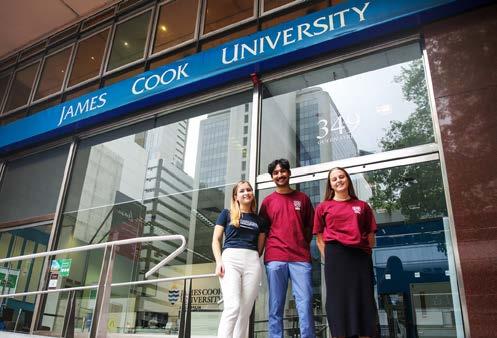

Our university campuses are supported by a network of study centres, including clinical schools and field stations. This geographical spread helps us further our commitment to help regional and remote communities gain access to high quality education.
JCU has two study centres in Mackay – the JCU Clinical Training Centre in the Mater Private Hospital and the JCU Mackay Clinical School in the Mackay Base Hospital. These practical learning facilities provide students with opportunities for hands-on clinical experience in nursing and pharmacy. They offer dedicated spaces for lectures, practical simulations and advanced medical training.
Together, these Mackay centres have the Indigenous name of Ngudya Yamba, meaning ‘place of knowledge’, given to JCU by the region’s Traditional Owners, the Yuwi people.
jcu.edu.au/mackay
The JCU Centre for Rural and Remote Health in Mount Isa provides access to health education for the remote west region of Queensland. JCU’s Bachelor of Nursing Science is offered in Mount Isa, while students in other health courses have the option to complete a professional placement in the region. The centre includes lecture rooms, research facilities, video conferencing facilities, a computer laboratory, a procedural skills laboratory and a growing health services library.
The Mount Isa centre has the Indigenous name of Murtupuni, meaning ‘come together, gather together’, given to JCU by the Kalkadoon people as the region’s Traditional Owners.
jcu.edu.au/mount-isa
The JCU Central Queensland Centre for Rural and Remote Health in Emerald was established to help attract, build and retain a high-quality health workforce across rural and remote Queensland. Through the centre, students in Allied Health, Nursing, Medicine and Dentistry courses gain essential hands-on experience in professional placements.
JCU acknowledges the Gayiri people as the Traditional Owners of the Emerald region.
jcu.edu.au/emerald
JCU is committed to research that improves the health of people and communities in the Tropics worldwide. The Australian Institute of Tropical Health and Medicine on Thursday Island is one place that makes this commitment possible. The institution’s Clinical Research and Training Facility provides learning facilities for JCU students and collaboration spaces for engaging with the Torres Strait community.
JCU’s centre on Thursday Island has the Indigenous name of Ngulaigau Mudh meaning 'house of knowledge' in the Kala Lagaw Ya dialect, given by the Kaurareg people as the island’s Traditional Owners.
jcu.edu.au/thursday-island
The Daintree Rainforest Observatory is located in lowland tropical rainforest at Cape Tribulation, in a unique part of the world where two World Heritage areas meet. JCU’s canopy crane makes it possible to view the rainforest from above, through its different levels and down to the soils and subterranean water resources. JCU monitors one hectare of rainforest to gather data with automated sensors and a wireless data network.
JCU acknowledges the Eastern Kuku Yalanji people as the Traditional Owners of the Daintree region.
jcu.edu.au/daintree
FLETCHERVIEW RESEARCH STATION
Experience the ‘classroom in the outback’ at JCU’s Fletcherview Station, a local working cattle station on 1,960 hectares, southwest of Townsville. Students in agriculture and veterinary science have access to industrystandard livestock handling facilities at Fletcherview, for studies in areas like animal reproduction, nutrition and pasture monitoring. The station’s size and diversity of land types, plant and animal species also draws interest from students in biology, botany, immunology and geology.
JCU acknowledges the Gudjal people as the Traditional Owners of the land where Fletcherview is now.
jcu.edu.au/fletcherview
ORPHEUS ISLAND RESEARCH STATION
The Orpheus Island Research Station offers easy access to the Great Barrier Reef's inshore reefs and islands. Students in Marine Science and related disciplines regularly visit Orpheus Island to study the mesmerizing complexity and diversity of nearby coral reefs, the myriad of organisms they support, historic shipwrecks and various other tropical coastal habitats, including the incredible mangrove forests. JCU's ‘classroom on the reef’ includes a multimedia lecture theatre, wireless internet, laboratory and testing equipment, a reference library and a huge coral reef display tank.
JCU acknowledges the Nyawaygi people as the Traditional Owners of the land they call Goolboddi and now referred to in English as Orpheus Island. jcu.edu.au/orpheus-island
Living on campus is a great way to make the most of university life. Each of our residences provides academic and wellbeing support, as well as a variety of social activities. With options for catered and selfcatered rooms, the opportunity to live alone or with roommates, you’ll discover that there’s a place for you at JCU.
Burralga Yumba is a seven-storey, 403-bedroom building located in the heart of the campus. It provides contemporary, self-catered student accommodation with a choice of private or shared bathroom facilities. All rooms include a king-single bed, study desk and chair, fan, air conditioning and Wi-Fi. Shared facilities include a kitchen with cooktops, ovens and refrigerators, an outdoor BBQ and a laundry. Other common areas include TV rooms, study areas, a sports lounge, theatre room and music room.
Rotary International House accommodates 118 students in 18 selfcatered apartments, each with two, six or seven individual bedrooms and shared kitchen and bathroom facilities. All rooms include a king-single bed, study desk and chair, fan, air conditioning and Wi-Fi. Common areas include furnished living rooms with sofas, a dining table and chairs, fans and a balcony. This is one of the smallest accommodation options on campus, surrounded by bushland in a quiet setting.
George Roberts Hall consists of eight blocks of up to 15 units, each with three or four bedrooms. All rooms include a king-single bed, study desk and chair, fan, air conditioning and Wi-Fi. All units have a communal lounge with a shared kitchen and bathroom facilities. This accommodation option provides residents with three meals each day, served in a communal dining hall. A larger common room and outdoor BBQ area are also available.
Saints Catholic College provides accommodation for 298 students across several buildings, with living options including shared or private bathrooms, fully catered dining and shared kitchenettes. All rooms include a king-single bed, study desk and chair, fan and Wi-Fi. Most rooms also have air conditioning. Other features for residents include UHD TVs, game consoles and streaming services available in common lounge areas, along with access to a courtesy car, health and wellness centre, mini soccer field and beach volleyball court.
The John Flynn College houses a total of 251 students in a mix of room types with shared, semi-private or private bathroom facilities and fully catered dining. All rooms include a king-single bed, study desk and chair, fan, air conditioning and Wi-Fi. Common areas include furnished living rooms with TVs and shared kitchenettes. Residents also have access to a business centre with computers, printers and binders, a music room and the JCU fitness centre.
Townhouses is an accommodation complex with 62 rooms across five houses of various sizes. Each house has shared kitchen facilities, shared bathrooms and communal living areas with a TV, sofas and dining table. Bedrooms have air-conditioning, Wi-Fi, a king single bed, wardrobe, study desk and chair. Other features include onsite car and bicycle parking, entertainment rooms, free laundry machines and a communal courtyard with a volleyball court, barbeques and lawn areas.
John Grey Hall is a seven-storey, 300-bedroom octagonal building which offers a variety of self-catered living options. These include studio apartments with ensuite, six-bedroom apartments with individual ensuites and six-bedroom apartments with shared bathroom facilities. All apartments include a modern kitchen with cooktop, microwave and refrigerator. All rooms include a king-single bed, study desk and chair, fan, air conditioning and Wi-Fi. Shared facilities include an outdoor BBQ area, gym, community garden, study areas, media room and laundry.
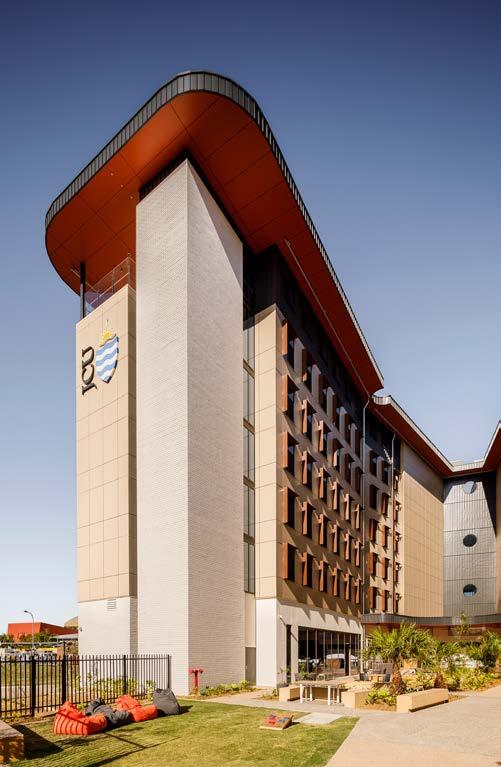
At JCU, we’ll do everything we can to give you the confidence and certainty you need to study at university. The options you choose will depend on the gap between your current situation and the prerequisite subjects or entry score you need for the course – that is, whether you need just a little help, or a bit more.
When you apply to study at JCU, your ATAR is converted into a selection rank to assess your suitability for a place in that course.
Several schemes are available which can increase your selection rank for entry to many undergraduate courses at JCU. Eligibility is determined by your personal circumstances, where you live and the types of subjects you completed at high school.
Educational Access Scheme
This scheme recognises applicants whose recent study was impacted by financial or personal challenges. These could include financial hardship, home environment and responsibilities, English language difficulty, personal illness and disability, or educational disruption. It is open to domestic applicants who apply through QTAC for undergraduate study at JCU, excluding Medicine, Dentistry or Veterinary Science. You’ll need to apply separately for the Educational Access Scheme through QTAC.
Regional Preference Scheme
If you live in regional or remote Australia, you may qualify for the Regional Preference Scheme which can offer applicants an automatic adjustment of their ATAR. It is open to domestic applicants who apply through QTAC for undergraduate study at JCU, excluding Medicine, Dentistry and Veterinary Science. If you are eligible, QTAC will adjust your selection rank at the time of assessment, so you don’t need to apply separately.
For details about these schemes visit visit jcu.edu.au/adjustment-factors
Subject Adjustment Scheme
This scheme allows for an automatic adjustment for subjects requiring a high level of skill and knowledge that are successfully completed in high school.
The Subject Adjustment Scheme is open to all domestic and international applicants completing Year 12, and can’t be used for entry to postgraduate degrees, graduate entry programs and courses with special application requirements.
Adjustments are cumulative up to a maximum of ten (10) rankings and some exceptions apply.
The bonus points are automatically applied by QTAC at the time you are assessed. This means you don’t need to apply for this scheme.
For details on which subjects are part of the scheme, visit jcu.edu.au/year-12/adjustment-factors
If you’re a Year 12 student, you have the opportunity to receive an early offer for most courses at JCU based on recommendations from your school. This lets you progress through the application process faster and enjoy a seamless transition to university life with earlier access to JCU’s support services.
You’ll need to list JCU as your first preference in QTAC and meet the relevant entry requirements for the course. Early offers are not available for courses in Nursing and Midwifery, Physiotherapy, Medicine, Dentistry and Veterinary Science.
For details about early offers visit jcu.edu.au/early-offers
Secure your guaranteed offer to study at JCU with a set combination of your current ATAR study in Year 12 and prerequisite subjects. Places are available in many of JCU’s undergraduate courses in Arts, Business and Commerce, Allied Health and Pharmacy, Biomedical and Marine Sciences, Engineering, IT, Law, Science and Social Work.
JCU will guarantee an offer to applicants who receive:
• An ATAR of 90 and above, without prerequisite subjects
• An ATAR of 73 and above, with all prerequisite subjects Guaranteed admissions are not available for courses in Advanced Science, Psychological Science, Education, Nursing, Physiotherapy, Medicine, Dentistry and Veterinary Science.
For details including the full list of eligible courses visit jcu.edu.au/guaranteed-admissions
ENTRY PATHWAYS
There’s more than one way to achieve your study goals. With the support of JCU’s pathways options, you could be on your way to studying at university faster than you thought.
Course Entry Diplomas
Prepare yourself for future career success in Engineering or Health with knowledge and skills specific to your chosen industry.
You’ll gain essential academic skills in first-year subjects that introduce you to university study and the fundamentals of each discipline. In just one year of full-time study, you’ll have a strong knowledge base and practical skills to transition into an associated Bachelor degree. Engineering diploma students also have the option to study part-time over two years.
For more information visit jcu.edu.au/diploma-of-engineering and jcu.edu.au/diploma-of-health
JCU Prep
Be ready with the subject knowledge and academic skills you need to succeed. JCU Prep lets you build a solid foundation to begin studying at university and be ready to apply for many the undergraduate course you want.
It’s ideal for students who finished high school without receiving an ATAR, left before completing Year 12 or just missing prerequisite subjects. You’ll learn the fundamentals of time management, essay structure and referencing conventions in the Introduction to Academic Learning module. Discover how to present academic arguments and collaborate with your peers for long-term career success.
Subjects in science, chemistry and mathematics can help you meet the study requirements of your course in as little as three months to one year full-time, depending on your study load.
For details about JCU Prep visit jcu.edu.au/courses/jcu-prep
VET and TAFE
If you have successfully completed a Certificate III, Certificate IV or an AQF Diploma course, you may be eligible for guaranteed entry into several JCU courses.* Depending on your chosen course, there could be additional subject prerequisites you are required to meet to gain entry.
These prerequisites generally require students to demonstrate english, mathematics or science knowledge at a particular level. If you do not meet the subject prerequisites for your desired course, JCU Prep is available as a pathway into your preferred degree.
Refer to the subject prerequisites listed for your specific course.
For more information visit jcu.edu.au/pathways-to-university/vettafe
*Excludes entry into the Bachelor of Advanced Science, Bachelor of Dental Surgery, Bachelor of Medicine, Bachelor of Surgery, Bachelor of Nursing Science – Bachelor of Midwifery, Bachelor of Physiotherapy, and Bachelor of Veterinary Science (Honours).
Don’t have any previous qualifications or study experience? You may be eligible to start studying a JCU degree based on an assessment of your paid work experience.
If you have spent more than the equivalent of six months full-time in paid employment you should clearly outline this on your QTAC application, including your job title and the main duties you performed. Your employment experience does not have to be related to the courses you want to study at JCU.
Your employment experience needs to be substantiated by signed statements from your employers.
For more information visit jcu.edu.au/pathways-to-university/work-experience
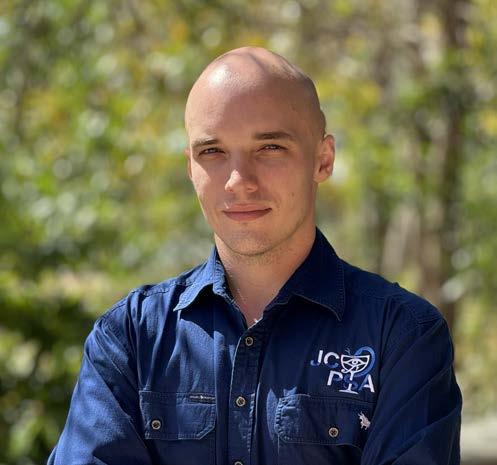
“The JCU Pathways program was more than just a stepping stone; it was a comprehensive journey that prepared me thoroughly for every aspect of my Bachelor's degree. It not only enriched my academic understanding but also honed my skills in areas like research, critical analysis, and collaboration. Owing to the nurturing environment created by the faculty and peers, I transitioned into my next academic phase with clarity and enthusiasm.”
Jordan Dickson JCU PATHWAYS ALUMNI
The Indigenous Education and Research Centre is the hub of Indigenous education, research and engagement at JCU, through successful and sustainable programs and services.
Get ready to open your mind to unique locations, immersive cultural experiences and extraordinary people.
The Centre encourages Aboriginal and Torres Strait Islander high school students to consider university through programs that offer a taste of campus life and help them to prepare for tertiary study. Specialist advisors provide Indigenous students with personal and study support throughout their time at JCU and beyond. It also manages the range of Indigenous Studies subjects available through the Bachelor of Arts.
Winter School
JCU’s winter program offers Indigenous students in Years 10, 11 and 12 the chance to experience university life during the mid-year school holidays. Over five days, students live on campus and take part in academic lectures and team-building sessions in an interactive program with JCU staff and students. All travel and accommodation costs for participants are covered.
Summer school
This school program is structured to help Indigenous students boost their study skills and knowledge in the summer break before they commence study at JCU. Students take part in revision lectures and tutorials in maths, academic literacy and digital literacy, along with team activities to prepare for the demands of university study. All travel and accommodation costs for participants are covered.
The Centre is host to a strong team of teaching staff, student support advisors and researchers, offering support services in dedicated facilities on campus in Cairns and Townsville.
Services
The Indigenous Academic Support Advisors have an in-depth understanding of the challenges students can face during their higher education studies. They can help you develop study skills, create an effective study plan and improve your academic progress.
Advisors can provide advice and information on accommodation options, financial services, scholarships, health and wellbeing services and ways to stay focused on your goals. They’ll be there to help you develop as an independent learner, build strategies to succeed and to stay motivated.
Facilities
Designated common and meeting spaces are available for Indigenous students to commune for study and peer support. Centres are fully air-conditioned with computers, printers and photocopiers, along with kitchens including a microwave, toaster and fridge, tea, coffee and healthy snacks for students. These are secure and monitored spaces accessible 24 hours a day, seven days a week.
Expand your understanding of the interface between Indigenous and Western knowledge, perspectives and practices in Australia today through JCU’s Bachelor of Arts. The Indigenous Studies major features subjects exploring Indigenous knowledge and traditions, colonial disruptions and Indigenous re-assertion in the current era. Some also include field trips to learn about the everyday realities, experiences and knowledges of Indigenous peoples.
For details on JCU’s Bachelor of Arts visit jcu.edu.au/Bachelor-of-arts
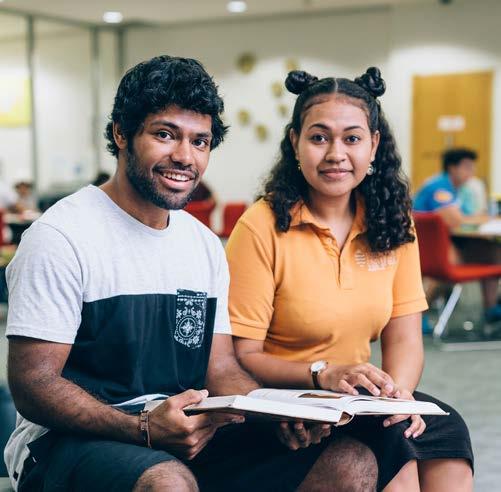
JCU’s Global Experience programs assist students to explore new ways of learning, build meaningful connections and develop a broader perspective on their career ambitions.
Take advantage of our international network of partnerships with universities across the world to develop the knowledge, skills and attitude to succeed in a global workforce – and have fun doing it!
Studying overseas supports you to:
• Develop your language skills
• Explore new perspectives and outlooks
• Pursue special academic interests in a fresh context
• Appreciate the shared goals that connect us globally
• Gain a new international perspective on your career path
• Explore the history, society and culture of your host country.
Make a lifetime of memories and earn credit towards your degree at the same time. Develop connections across cultures and insights to expand your life experience beyond JCU.
INTERNATIONAL EXCHANGE
Study at an international partner university for one or two semesters at an undergraduate or postgraduate level. While you’re there, you’ll earn credit towards your JCU degree and continue to pay course fees to JCU.
SHORT STUDY OPTIONS
Several of JCU’s partner universities and organisations offer programs that you can complete during university breaks for up to six weeks. Access study opportunities all over the world during the Australian summer and winter holidays.
This grant program provides financial support for Australian undergraduate students to participate in group study tours, short learning intensives and research in many Indo-Pacific host locations.
Each year, this scholarship program supports around 120 Australian students to study for up to a year in the Indo-Pacific region. You’ll learn and engage with communities to help achieve New Colombo Plan goals.
Students based in JCU’s Cairns and Townsville campuses can experience Singapore’s diverse culture through a study exchange with James Cook University (Singapore Campus). You’ll study subjects that can be credited towards your degree over two trimesters.
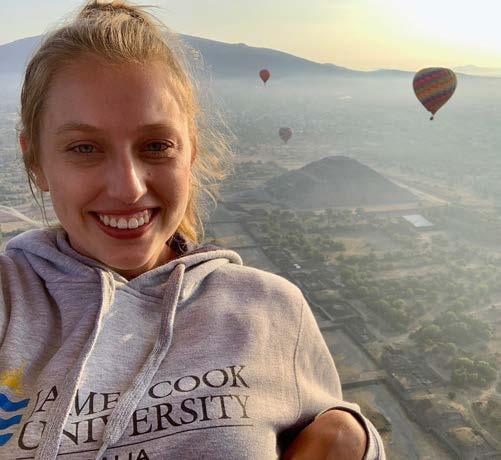
“I wanted to experience life on the other side of the world. I even had the opportunity to volunteer in a lab whilst I was there. Being taught by world-renowned scientists and meeting a bunch of like-minded people made my exchange experience - I now have friends all over the world.”
Kathryn McKenna
Bachelor OF SCIENCE – MARINE BIOLOGY Exchange student at the University of Miami
University study includes terminology that you may not be familiar with at first. These are some of the more common terms you’re likely to come across while exploring your study options.
The first weeks are exciting and busy. There is so much for new students to do, see, learn and remember.
University will be a very different environment for those coming from a school or workplace background. Tertiary students are adult learners and are expected to manage their study responsibilities accordingly.
The key to succeeding at uni is time management. Students can get the most out their degree by allocating a minimum of 10–12 hours per week for each subject. They can maximise the 25 per cent of their time spent in face-to-face classes by using the other 75 per cent on independent study to prepare them for their lectures and tutorials.
This self-directed study will include academic reading, reviewing notes, completing tutorial exercises, group study, as well as assignment and exam preparation. A weekly planner as well as a study period planner are great tools that students can use to stay on top of their study. Students can download templates for these from The Learning Centre. jcu.edu.au/learning-centre
Plan for success
Encourage your teen to attend all classes and create a weekly and semester study plan to reduce stress and stay on track. Remind them to ask questions, especially in the first few weeks.
Organise a study spot
Create a space where your teen can leave textbooks open and notes arranged, without having to pack up whenever they finish studying. A quiet place with good lighting and a comfortable chair is ideal.
Encourage them to use the JCU Library, which is open seven days a week during teaching periods and offers inviting learning and social spaces.
Be flexible with family commitments
There are times in the academic calendar when students really need to focus on their studies and forego some other activities. You can support them by trying to arrange holidays and celebrations to coincide with ‘quiet’ times in the academic year, such as between teaching periods. Expect your teen to devote more time to their studies when assignments are due and during the exam period.
Make use of JCU’s support services
JCU has a range of services available to support student success and wellbeing. Academic support, wellbeing and counselling, AccessAbility, careers and employment and mentoring services are all available at no cost. If you or your teen have concerns, seek information or advice from a relevant student support service, or visit jcu.edu.au/support
Encourage them to participate in uni activities
Meeting new people — students, academics, and other JCU staff — will help your teen develop valuable support networks and a sense of belonging. These contacts can be helpful when challenges arise, as well as for work experience and professional opportunities. View information about student clubs and other activities at jcu.edu.au/student-life
Prepare young adults for living away from home
Check that they have a Medicare card, a Tax File Number, Health Care card, personal bank account and relevant phone apps for maps and public transport. A driver’s license and a certified copy of their birth certificate are also useful as extra ID.
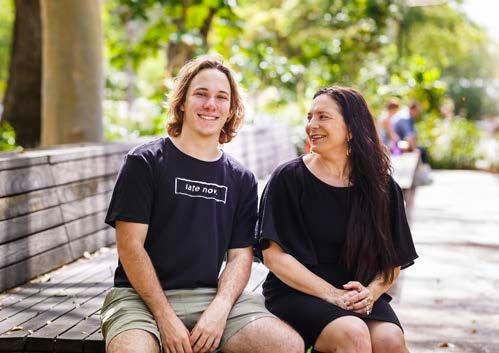
“Between study, part-time work, family commitments, and social life, university really is a big adjustment. From a parent’s point-of-view, I would recommend taking an interest in what’s happening and offer as much support as possible - but also remember that this is a new and exciting experience for our kids and we should encourage them to take advantage of it.”
Lisa Moody PARENT
You’ll find these and many more terms on our website, in course handbooks and within JCU’s policies, rules and regulations.
ATAR - The Australian Tertiary Admissions Rank, which provides a national comparative ranking of a student’s academic performance in Year 12 relative to others graduating in the same year.
Bachelor degree - An undergraduate academic qualification, typically requiring three to five years of full-time study or part-time equivalent.
Bachelor (Honours) degree - A Bachelor degree with a further full-time year of advanced studies offered to high-achieving students or included in a Bachelor (Honours) degree structure, providing a pathway into research and further study.
Commonwealth Supported Place - A study place where your tuition fees are subsidised by the Australian Government. JCU offers Commonwealth Supported Places for eligible students on all undergraduate degrees.
Credit for previous study - Recognition of studies already completed at other tertiary institutions that can count as credit points towards your course at JCU. It may also be referred to as ‘advanced standing’ or ‘recognition of prior learning’.
Credit points - A basic measure of study load for each subject, with most subjects at JCU carrying a unit value of three credit points. A typical full-time study load for one academic year is 24 credit points (eight subjects), while part-time is generally no more than 75 percent of a full-time study load.
Diploma - A sub-degree undergraduate academic qualification, typically requiring one to two years of full-time study or part-time equivalent.
Early offers - A program to help you secure a place to study at JCU before you finish Year 12, based on your school’s recommendation and assessment of your academic performance, motivation and capabilities. You would still need to complete Year 12 and meet entry requirements for your chosen course of study.
Guaranteed Admissions Plan - Students with an ATAR of 90 and above are guaranteed entry into particular JCU courses with all subject prerequisites waived. Those with an ATAR of 73 and above are guaranteed entry to these courses if all subject prerequisites are met.
Handbook - Official and central source of information for all courses and subjects offered by JCU.
Intake - The time of year that you can start your degree, usually the start of a semester or trimester.
Major - A primary area of specialisation within a Bachelor degree, including around eight related subjects in particular discipline.
Minor - A sub-specialisation in a Bachelor degree, including around four related subjects in an area of study.
Offer rounds - The series of dates throughout the year when universities offer of study places to applicants, either directly or through a tertiary admission centre.
Orientation - Often referred to as O Week, it is designed to welcome new students and provide information about your course, the campus and the range of services available.
Preferences - You can select up to six undergraduate degrees you’d most like to apply and be accepted for. First and second on your list would be the degrees you’d most like to study, followed by other options you’re interested in as third and fourth. Your choices for five and six would be courses you are willing to study as a back-up and are confident you’ll receive an offer for. You’ll only be eligible for an Early Offer on JCU courses you nominate as your first preference. You can add, delete, or change the order of your preferences online via your tertiary admission centre.
Prerequisite - A high school or university subject that you must complete before starting your degree or taking a higher-level university subject.
Professional placement - Training and experience in a professional work environment that is part of your degree, designed to extend your knowledge and practical skills. It may also be referred to as ‘work integrated learning’.
QTAC - The Queensland Tertiary Admissions Centre (QTAC) operates a centralised tertiary application service. It assesses applications against entry requirements provided by JCU and then makes offers to successful applicants during offer rounds.
Recommended knowledge - While not essential, prior study in these areas may assist you to understand more about the topics in a course of study.
Semester - A study period of around 13 weeks duration, with the academic year divided into two study periods.
Special entry requirements - Some degrees require applicants to meet additional selection criteria or complete additional steps in the application process. This could be demonstrating prior study or industry experience, a supporting written application or a personal interview with JCU academic selectors.
Study load - The number of subjects and associated credit points you take on per study period.
Study period - The period of time during which all aspects of subject delivery are scheduled, including reading and preparation, lectures, tutorials, practical sessions and assessment.
Subjects - The building blocks of academic study, with each carrying a unit value in credit points that count towards a degree. Core subjects must be completed to meet course requirements, while elective subjects can be chosen from a broader range of options.
Testamur - Your official graduation certificate confirming you have completed your degree.
Trimester - A study period of around 10 weeks duration, with the academic year divided into three study periods.
Undergraduate study - An academic program of study leading to a Diploma, Bachelor degree or Bachelor (Honours) degree.
Take what you like learning and turn it into a career with a degree from JCU. Our handy guide lets you join the dots between what you’re interested in and the study options available.
Areas of study that I enjoy JCU Degrees
Arts, Social Sciences and Humanities
Business and Commerce
Engineering and Information Technology
Health and Physical Education
• B. Arts (Majors: Anthropology, Archaeology, Criminology, English, History, Human Geography, Human Services, Indigenous Studies, Politics and International Relations, Psychology Studies, Sociology)
• B. Business (Majors: Business Intelligence and Information Systems, Hospitality and Tourism Management, Human Resources Management, International Business, Management, Marketing for the Digital Age, Sports and Event Management)
• B. Engineering (Honours) (Majors: Chemical Engineering, Civil Engineering, Electrical and Electronic Engineering, Electronic Systems and Internet of Things Engineering, Mechanical Engineering)
• B. Biomedical Sciences (Majors: Bioinformatics, Health, Medical Laboratory Science, Molecular and Cell Biology, Microbiology and Immunology, Physiology and Pharmacology)
• B. Dental Surgery
• B. Medicine, B. Surgery
• B. Nursing Science
• B. Laws
• B. Education (Early Childhood Education)
• B. Education (Primary)
• B. Education (Secondary)
• B. Social Work
• B. Commerce (Majors: Accounting, Banking and Finance, Economics, Financial Advising, Financial Management, International Trade)
• B. Information Technology
• B. Nursing Science B. Midwifery
• B. Occupational Therapy (Honours)
• B. Pharmacy (Honours)
• B. Physiotherapy
• B. Psychological Science
• B. Speech Pathology (Honours)
• B. Sport and Exercise Science
• B. Biomedical Sciences (Majors: Bioinformatics, Health, Medical Laboratory Science, Molecular and Cell Biology, Microbiology and Immunology, Physiology and Pharmacology)
• B. Environmental Science and Management (Majors: Biodiversity Assessment and Management, Coast to Coral, Land and Water Management, People in Place)
• B. Marine Science
• B. Medicine, B. Surgery
• B. Science, B. Advanced Science (Majors: Aquaculture Science and Technology, Chemistry, Data Science, Environmental Earth Science, Geology, Marine Biology, Mathematics, Molecular and Cell Biology, Physics, Zoology and Ecology)
• B. Veterinary Science (Honours)
Examine human behaviour and knowledge, the complexities of societies and the connections between people, places and politics. Develop the critical thinking skills necessary to understand society, help facilitate change and bring fresh perspectives to your future career.
Expand employability opportunities through elevated thinking
Develop a cross-cultural understanding of your field that enhances your expertise
FEES: $11,395* | ATAR: 59 | ENTRY REQUIREMENTS: English (Units 3/4,C)
WHAT TO EXPECT
• Learn to think creatively, analyse effectively and build the crosscultural communication skills necessary to understand the people around us and make a difference in today’s modern society.
• Develop your critical judgement to respond to social, cultural and political issues. You may also have the opportunity to explore the world through a JCU Global Experience program.
• Study core subjects in the arts, humanities and social science disciplines alongside your preferred major. Choose to add a second major that complements your studies or broadens your expertise.
• Joint degrees are also available with the Bachelor of Arts. Combine Arts with a Bachelor of Business, Bachelor of Laws or Bachelor of Science.
MAJORS
Anthropology
Examine social and cultural differences to understand how people’s beliefs fit into a wider social, political and economic context, using research, observation and human engagement. Build your knowledge and practical skills to work with diverse groups in Australia, the AsiaPacific and across the globe.
Archaeology
Unearth human history to understand our evolution from tropical Africa to more recent cultural diversity among civilisations and societies across the globe. Develop your skills in archaeological site recording and conservation and make the most of opportunities to complete field-based studies in Australia and overseas.
Examine the complex causes and consequences of crime, methods of crime prevention, systems of social control, theories of criminal justice and rehabilitation. Draw on skills from related disciplines to assess the ethical and political impacts of crime issues.
English
Examine a wide range of literary periods and genres to build critical communication and reasoning skills and develop your understanding of the English language. This may involve reflecting on texts, developing your own writing skills and creating your own stories.
History
Analyse major historical events in a global context and investigate how political, economic and environmental events shaped different communities. Build your understanding of humanity by examining societies and cultures in Australia’s history.
Human Geography
Consider the links between our physical, social, economic and political environments, and their collective influence on how humans engage with the world around them. Expand your skills in planning and design, regional sustainability and environmental impact assessment.
Human Services
Forge a career that is connected to the community through networks of agencies to address human needs in society. Develop the skills to work with vulnerable people facing challenges including poverty, homelessness, domestic violence and mental health.
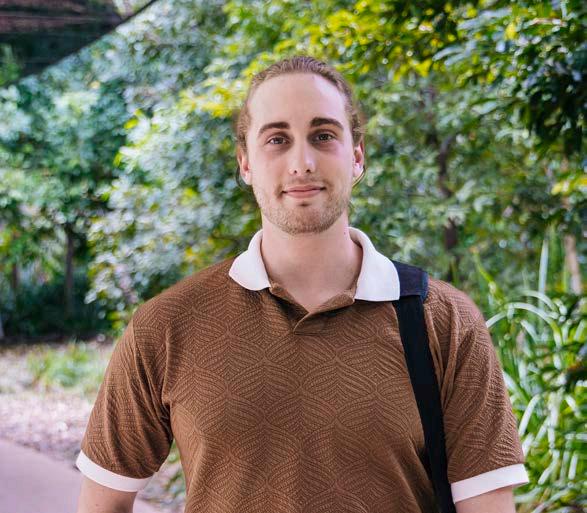
Indigenous Studies
Examine the history, perspectives, knowledge and lived experiences of Aboriginal and Torres Strait Islander peoples to thoughtfully engage with Indigenous matters. Learn about Indigenous knowledge, traditions and methods of participation in contemporary matters. �
Politics and International Relations
Discover how ideas can influence policy, economics and societal outcomes in Australian and international politics. Study the functions of political power and processes, policy, diplomacy, political economy and the globalisation of the Asia-Pacific region.
Psychology Studies
Study psychological theory, human perception and social interaction to understand the influence of brain functions on decision-making and other behaviours. Consider the impacts of environment and culture on how we learn, interpret and remember information.
Sociology
Develop the analytical skills to learn how society is organised and how people relate to and interact with each other, objects and the world around us. Study social trends and the evolution of societies through history.
“My Bachelor of Arts studies have equipped me with the critical thinking skills and knowledge necessary to better navigate interpersonal and intercultural exchanges with care and clarity."
Cole Brown
BACHELOR
OF ARTS STUDENT
Develop extensive practical skills, working with experienced researchers and health science professionals on significant local and global challenges in tropical health and disease management. Graduates are equipped to excel in careers involving medicine, dentistry, allied health, veterinary science and medical laboratory science.
FEES: $9,090* | ATAR: 65 | ENTRY REQUIREMENTS: English (Units 3/4,C)
Recommended Knowledge: Mathematical Methods (Units 3/4,C), Chemistry (Units 3/4,C); plus one of Biology, Health, Physical Education or Physics
WHAT TO EXPECT
• Understand the relationship between science and medicine. Study human biology, from molecular to whole-body systems, and understand how the body responds to disease.
• Engage with foundational learning in chemistry, physics and genetics. Expand your knowledge with subjects in bioinformatics, veterinary science or healthcare.
• Develop valuable work skills with hands-on experience in laboratories, hospitals, and medical centres from your first year.
CAREER OPPORTUNITIES
• Biomedical scientist
• Clinical trials coordinator
• Forensic scientist
MAJORS
Bioinformatics
• Health researcher
• Laboratory technician
Health
Be equipped for a future in the medical, dental or allied health industries. Develop an advanced understanding of anatomy, physiology, pathophysiology and bioengineering. Use this major as your starting point to build the foundational knowledge required to excel in the health service industries.
Medical Laboratory Science
Be at the forefront of healthcare research and diagnostics and develop extensive theoretical and medical knowledge across several fields of medical science. You will gain hands-on clinical and laboratory skills with placement opportunities and training in world-class diagnostic medical laboratories and research centres.
Microbiology and Immunology
Gain skills and knowledge in the theories of epidemiology, molecular genetics, cell biology, and advanced immunobiology. Extend your knowledge by understanding and analysing the theories of infectious diseases and tropical microbes. Graduates majoring in microbiology can apply for membership of the Australian Society of Microbiology.
Molecular
Hone the skills to collect, understand and apply biological and medical data. Understand how data is managed in the medical and healthcare fields and contribute innovative solutions to complex problems. Build expertise in this rapidly expanding field that has clinical, research, and governmental applications.
Study and apply the theories of modelling natural systems, quantitative methods in science, molecular genetics, and cell biology. Develop knowledge and skills in the field of immunology, understand the origins of specific diseases and disorders and examine tropical microbes.
Physiology
Advance your understanding of the theories of epidemiology, molecular genetics, cell biology and pathobiology. Gain the knowledge and skills to understand and apply pathophysiology and therapeutics theory. Consolidate your professional practice, laboratory management and quality assurance skills to ensure you can excel in numerous pharmacology roles.
Bring your big ideas and a drive for success. JCU’s strong focus on professional development and multidisciplinary education prepares our business and commerce graduates for success in a diverse and exciting career. Skills development

FEES: $15,450* | ATAR: 59 | ENTRY REQUIREMENTS: Recommended Knowledge: English (Units 3/4,C); Mathematical Methods (Units 3/4,C)
WHAT TO EXPECT
• Become a professional who can lead an organisation, support its strategy and innovate its operations. Learn how decisions you make contribute directly to your organisation’s success.
• Understand what it takes to create and manage a sustainable business. Gain real-world industry experience with the option to complete an internship within a local business or an industry project.
• Tailor your business degree to suit your interests. Choose elective subjects to compliment your choice of business major to boost your career options.
• Joint degrees are also available with the Bachelor of Business. Combine Business with a Bachelor of Arts, Bachelor of Laws or Bachelor of Psychological Science.
CAREER OPPORTUNITIES
• Human resources professional
• Marketing manager
MAJORS
• General manager
• Tourism and events manager
• Trade policy advisor
Business Intelligence and Information Systems
Learn how to use data mining, modelling, business analytics and information processing to gain business insights. Use technology to create cost-effective systems and manage large amounts of data securely.
Hospitality and Tourism Management
Gain the professional expertise to manage businesses in hospitality and tourism. Explore the logistics involved in the travel and accommodation, recreation, food, event management and creative industries.
Human Resources Management
Discover what motivates employees and how to boost organisational productivity. Learn how to communicate effectively, develop positive employment relationships and create environments that help people thrive.
International Business
Develop the skills to conduct business across complex global markets. Learn to negotiate international trade arrangements within supply chains involving producers, suppliers, stockists and transport providers.
Management
Explore methods for managing businesses in highly competitive environments. Learn to plan effectively, control finances and resources, direct operations and solve organisational problems with confidence.
Marketing for the Digital Age
Gain the skills to engage with your customers through marketing, advertising and interactive media. Understand consumer behaviour to create sustainable marketing strategies for real-world businesses.
Sports and Events Management
Enter the dynamic environment of sports and events. Learn how to interpret client briefs and turn ideas into reality. Gain the management skills to control the delivery of activities, on time and to budget.
FEES: $15,250* | ATAR: 59 | ENTRY REQUIREMENTS: Recommended Knowledge: English (Units 3/4,C); Mathematical Methods (Units 3/4,C)
WHAT TO EXPECT
• Examine the factors that influence domestic and global economies and financial systems. Learn how to recognise patterns or trends in financial markets and understand the drivers of economic growth.
• Develop your skills in interpreting quantitative and qualitative data, communicating market insights and making data-driven decisions.
• Work alongside leading commerce professionals in a business internship or project for the opportunity to gain real-world industry experience.
CAREER OPPORTUNITIES
• Accountant
• Investment consultant
• Financial advisor or planner
MAJORS
Accounting
• Economist
• Stockbroker
“I chose a regional university rather than a major city because the help you receive is personal and tailor-made for you. The lecturers know you by name and introduce you to their professional networks. For me, the biggest strength of the course is the Work Integrated Learning modules paired with the internships.”
Suhithri Paranamanage
BACHELOR OF COMMERCE ALUMNI
Gain an in-depth understanding of financial management, company accounting, taxation and auditing. Learn to manage costs and budgets, recognise financial patterns and become an efficient business problem solver.
Banking and Finance
Study financial markets, funds management, investment strategies and risk management. Examine international finance and the different approaches to managing financial institutions for sustainable economic growth.
Economics
Learn to recognise drivers of economic growth and predict the behaviour of market participants, including governments, businesses, and consumers. Examine business decision-making and how to conduct cost-benefit analysis.
Financial Advising
Build the skills to deliver tailored advice for a wide variety of clients to make decisions about their financial futures. Become an expert in estate planning, superannuation, budgeting, investments, risk management and insurance.
Financial Management
Gain an in-depth understanding of business modelling, investment portfolio management, financial risk management and multinational finance to predict market fluctuations and manage impact on businesses.
International Trade
Develop the diplomacy and negotiation skills necessary to support trade between nations and multinational corporations. Explore the links between economics, law, finance and politics in global supply chains.
JCU Dentistry is a leader in health equality. Experience working in a range of settings, from rural and remote communities to city areas and international placements. Dentistry graduates work independently in challenging situations.
in Australia for median graduate
#1 in Queensland for skills development
Through a career in Education, you can help young people develop the curiosity, creativity and critical learning skills they need to achieve their potential. Teachers with the skills and experience to connect with the next generation are in high demand.
Five stars for
Unique opportunities
Study and work in metropolitan, rural and remote communities
FEES: $11,200* | ATAR: Special Entry Requirements
ENTRY REQUIREMENTS: English (Units 3/4,C); Mathematical Methods (Units 3/4,C); Chemistry (Units 3/4,C) Recommended Knowledge: Biology (Units 3/4,C)
WHAT TO EXPECT
• Gain a comprehensive education in oral health and health care in Australia, with crucial insight into the dental issues of people in rural, remote and Indigenous communities.
• Develop practical work skills in JCU’s world-class clinical simulation laboratory. Apply your technical knowledge to assess, diagnose and treat real patients at JCU’s dental clinics.
• Learn from experienced and supportive professionals. Gain more than 2000 hours of supervised professional placements in private practices and public clinics.
• The Bachelor of Dental Surgery (Honours) degree is available for high-achieving students.
NEXT STEPS
After your Bachelor’s degree, you'll need further study and practical experience to qualify for dental specialist roles including:
• Endodontist
• Forensic odontologist
• Oral surgeon
• Orthodontist
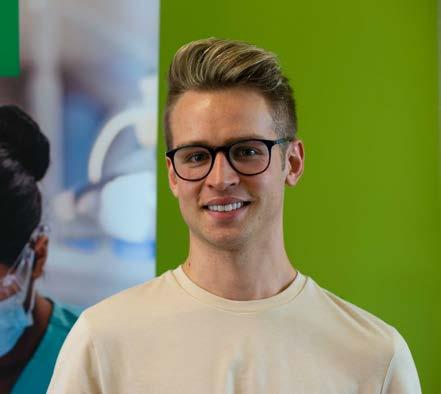
“Employers know we are work-ready as we have had so many different experiences treating patients and a really high volume of clinical hours. All the graduating students I speak to feel confident and ready to start their career. JCU is how all dental schools should be.”
• Paediatric dentist
• Periodontist
• Prosthodontist
BACHELOR OF DENTAL SURGERY ALUMNI
FEES: $4,627* | ATAR: 65 | ENTRY REQUIREMENTS: English (Units 3/4,C); One of General Maths, Mathematical Methods or Specialist Maths (Units 3/4,C)
WHAT TO EXPECT
• Build practical job skills, with 120 days of professional placement experience in childcare centres, preschools, kindergartens and in primary schools teaching Prep to Year 3.
• Build your knowledge of child development to engage, encourage and support early learners in literacy, numeracy, technology, humanities and more.
• Understand the diverse learning needs of children from birth to 8 years and graduate with a nationally accredited degree to teach across Australia and internationally.
Course is available in block study mode
FEES: $6,010* | ATAR: 65 | ENTRY REQUIREMENTS: English (Units 3/4,C); One of General Maths, Mathematical Methods or Specialist Maths (Units 3/4,C)
WHAT TO EXPECT
• Learn how to engage with primary school students from Prep to Year 6, using creative activities and strategies to maintain positive, respectful learning environments.
• Develop the skills and confidence to lead a classroom, with 85 days of professional placement experience in primary schools within regional, rural and Indigenous communities.
• Choose to specialise in teaching English literacy, mathematics, science or physical education.
� � Course is available in block study mode
Five stars for median graduate
FEES: $5,938* | ATAR: 65 | ENTRY REQUIREMENTS: English (Units 3/4,C); One of General Maths, Mathematical Methods or Specialist Maths (Units 3/4,C)
Note: Mathematical Methods required for students
WHAT TO EXPECT
• Learn to establish positive and engaging learning environments for students in Years 7 to 12. Gain a full understanding of intercultural and ethical approaches to professional practice.
• Develop the skills and confidence to lead a classroom, with 85 days of professional placement experience in secondary schools within regional, rural and Indigenous communities.
• Choose two teaching areas to focus on, from a broad selection including biology, business, chemistry, digital technologies, economics, english, geography, health and physical education, history, legal studies, mathematics and physics.
CAREER OPPORTUNITIES
• Early childhood teacher
• Primary school teacher
High
Prepare yourself for the challenges of tomorrow with an engineering qualification shaped by industry. You’ll gain a unique perspective on the contribution of engineering to rural, remote and tropical regions, with the skills and knowledge to tackle all types of projects.
JCU’s Environmental Science and Management students develop an understanding of how to manage the interactions between people and the environment to find solutions to complex environmental problems. Be ready to pursue a career in environmental conservation, research, communication or management.
FEES: $8,050* | ATAR: N/A | ENTRY REQUIREMENTS:
Successful completion of a course of study equivalent to an Australian Year 12 Certificate
WHAT TO EXPECT
• Take the first step towards a diverse and innovative career in Engineering by examining the role of engineers as problem-solvers, the functions of engineering within society and the profession’s contribution to industry.
NEXT STEPS
Transition directly into the Bachelor of Engineering (Honours) with your first-year subjects completed.
FEES: $8,170* | ATAR: 70 | ENTRY REQUIREMENTS:
Recommended Knowledge: English (Units 3/4,C); Mathematical Methods (Units 3/4,C)
WHAT TO EXPECT
• Build a thorough understanding of engineering fundamentals in your first year. Progress through a specialised major of your choice, plus one minor or four elective subjects.
• Engage in practical laboratory classes, field-based study and 12 weeks of professional placements. Complete a research project and thesis in your final year.
• Joint degrees are also available with the Bachelor of Engineering. Combine Engineering with a Bachelor of Information Technology or Bachelor of Science.
CAREER OPPORTUNITIES
• Engineer (Civil, Chemical, Electrical, IoT or Mechanical)
Chemical Engineering
Apply the principles of chemistry and physics to transform raw materials into other products.
Civil Engineering
Learn to design, construct and maintain the essential infrastructure of our modern world, including buildings, roads and bridges, railways, airports, dams and water supply, energy networks and mines.
Electrical and Electronic Engineering
Build a comprehensive knowledge of electrical materials, circuit theory, power system modelling and signal processing. Learn to design and maintain electrical energy infrastructure using electrical principles.
Electronic Systems and Internet of Things (IoT) Engineering
Design the next generation of electronic technologies with expertise in sensors, radio networks, and big data analytics. Examine software solutions for control systems, cloud computing and machine learning.
Mechanical Engineering
Learn the foundations of thermofluid mechanics and the dynamics of machine elements. Apply your knowledge to design, manufacture and maintain machines.
MINORS
Combine your major with a minor in Data Science, Infrastructure and Environment, Mathematics, Mechatronics, Mining and Minerals, Physics, Software or Sustainability.
FEES: $10,040* | ATAR: 63 | ENTRY REQUIREMENTS: Recommended Knowledge: English (Units 3/4,C); Chemistry (Units 3/4,C); One of General Maths or Mathematical Methods (Units 3/4,C)
WHAT TO EXPECT
• Explore the social and institutional aspects of environmental management.
• Learn how the biological, physical, social, economic and political spheres interact and impact on our environment.
• Gain practical experience through laboratory classes, field-based study, research projects and the option to complete a professional placement in your final year.
CAREER OPPORTUNITIES
• Environmental scientist
• Biodiversity project officer
• Conservation officer
• Water quality specialist
• Environmental planner
• Park ranger
MAJORS
Biodiversity Assessment and Management
Learn the essential concepts of biodiversity, biological processes and ecology. Gain the skills to assess and manage aquatic and terrestrial species. Complete field-based studies focused on data collection methods and tropical flora diversity in World-Heritage listed coastal, tropical savannah and rainforest environments.
Coast to Coral
Examine the fundamental principles of marine environments and consider the unique management challenges and opportunities they present. Study the key concepts in ecology, coral reef management and geomorphology, with a focus on coastal, estuarine and mangrove ecosystems.
Land and Water Management
Learn about physical geosciences, environmental processes and impacts on land, wetlands, river catchments and coasts. Complete field-based studies in hydrological processes, water quality management and soil science.
People in Place
Consider resource values, use and management, with a focus on the ways in which people interact with the environment. Explore elements of anthropology, geography, project management and hazard reduction and hone your communication skills to collaborate with stakeholders and Indigenous peoples from different backgrounds.
Build a thriving career in Information Technology, using design thinking to identify technology issues and implement creative solutions. A strong focus on practical experience develops graduates who are agile thinkers and innovative developers.
#1 in Australia for student support
Access the best Learn from lecturers and industry professionals committed to your success #1 in Australia for teaching quality
FEES: $9,314* | ATAR: 63 | ENTRY REQUIREMENTS:
Recommended Knowledge: English (Units 3/4,C); One of General Maths or Mathematical Methods (Units 3/4,C)
WHAT TO EXPECT
• Learn in specialised computer laboratories with features for software design, programming, computer science, networking, multimedia and game design.
• Develop industry-required skill sets for working with databases, artificial intelligence, cybersecurity, machine learning, data mining and cloud computing.
• Work on real-world projects within industry through hackathons, technology design sprints, projects and the option to complete an internship with professional placement experience.
• A joint degree is also available with the Bachelor of Information Technology. Combine Information Technology with a Bachelor of Engineering.
CAREER OPPORTUNITIES
• Network administrator
• Systems analyst
• Software developer • Technical writer • Help desk analyst
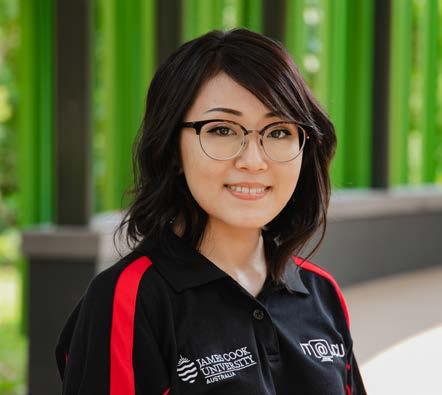
"What I really like about the course is that it allows me to explore my creative side and come up with innovative solutions that have the potential to make a big difference in the world. I’m glad I chose JCU because it has such a great support network and sense of community."
Marina Sugita
BACHELOR OF INFORMATION TECHNOLOGY STUDENT
Examine the role of law in social, economic, environmental, and political contexts and its significance for stable government, economic prosperity and the protection of individual and cultural rights. An emphasis on independent thinking and innovative problem solving develops graduates equipped for contemporary legal practice.
Graduate job-ready
Accredited study for admission to practise law in Queensland Five stars for student teacher ratio
Finish sooner
Get a head-start on your career with a streamlined 3-year program
FEES: $16,992* | ATAR: 75 | ENTRY REQUIREMENTS: English (Units 3/4,C)
WHAT TO EXPECT
• Study the core concepts of law and learn how to apply your legal skills in areas including contracts, personal property and land, criminal, company, constitutional, and administrative law.
• Build the skills to review contracts, argue a criminal case, negotiate litigation settlements and interpret matters of constitutional law.
• Excel with hands-on learning in real-world scenarios and a minimum of 12 days (100 hours) in professional placements, under the supervision of a legal practitioner.
• Joint degrees are also available with the Bachelor of Laws. Combine Laws with a Bachelor of Arts, Bachelor of Business or Bachelor of Science.
CAREER OPPORTUNITIES
• Solicitor or Barrister
• Criminal prosecutor
• Contracts compliance officer
• Government advisor
• Business consultant
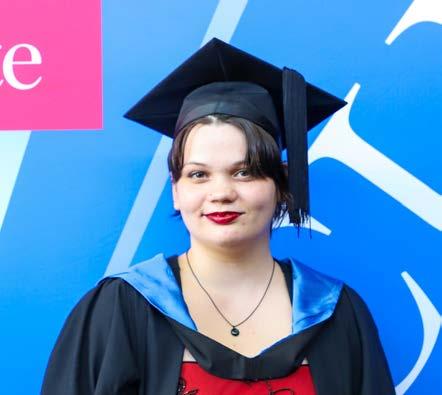
“I chose to study law at JCU due to its close proximity to home and its positive reputation. The Indigenous Centre and JCU community provided me with incredible support, and I've graduated with a new network of close friends. I secured a job while studying, and I aim to climb the career ladder within the workplace.”
Kaitlyn Hepple
BACHELOR OF LAWS ALUMNI
Take on the many challenges facing our oceans with access to incredible learning environments. Develop expert knowledge and professional skills in various coral reef, island, seagrass and mangrove environments along the Great Barrier Reef.
Apply your enquiring mind and knowledge of the human body to combat disease, improve treatment methods and restore people to good health. Build on foundational skills in clinical pathology and patient management to become an effective and empathetic doctor.
#1 in Queensland for median graduate salary
FEES: $8,320* | ATAR: 75 | ENTRY REQUIREMENTS:
Recommended Knowledge: English (Units 3/4,C); Chemistry (Units 3/4,C); One of General Maths or Mathematical Methods (Units 3/4,C)
WHAT TO EXPECT
• Explore ways to better understand, protect, and manage marine ecosystems and resources as you examine the ecological, geological, chemical and physical processes that structure global marine and coastal systems.
• Study in JCU’s advanced research aquariums and laboratories. Expand your skills in seabed mapping, fish assessment, drone deployments and the application of oceanographic sensors and other marine technologies to gather data above and below the waves.
• Gain hands-on experience through field-based studies including at JCU’s Orpheus Island Research Station, or potentially on overseas expeditions to locations such as the Galapagos and Thailand.
CAREER OPPORTUNITIES
• Marine scientist
• Oceanographer
• Ecotourism advisor
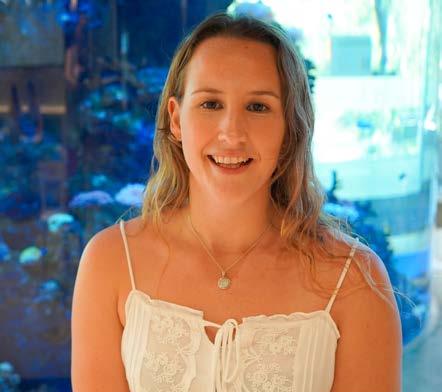
#1 in Queensland for overall educational experience
Five stars for learner engagement
• Environmental scientist
• Marine resource manager
“There is no doubt that JCU is the world’s best place to study marine science. The array of classes is just phenomenal, the field work opportunities are endless and the enthusiasm of all the lecturers is truly inspiring. With so much research going on, there are lots of opportunities for volunteering and networking."
Marissa Hutchings
BACHELOR
OF MARINE SCIENCE
STUDENT
FEES: $13,241* | ATAR: Special Entry Requirements ENTRY REQUIREMENTS: English (Units 3/4,C); Mathematical Methods (Units 3/4,C); Chemistry (Units 3/4,C)
WHAT TO EXPECT
• Examine how the human body functions at a molecular and cellular level, explore human anatomy and physiology and the areas of pathology, immunology, preventive medicine and the Australian healthcare system.
• Learn to diagnose a broad range of medical conditions with over 4,000 hours of hands-on learning and extensive professional placements, from the outback to the Torres Strait.
• Develop extensive clinical capabilities in rural and remote medicine, working within Indigenous and other underserved communities.
NEXT STEPS
After your Bachelor degree, you will be eligible to work in a hospital setting as an Intern. To qualify for specialist roles you need additional practical experience and study. These specialist roles include:
• Anaesthetist
• Cardiologist
• General Practitioner
• Obstetrician/Gynaecologist
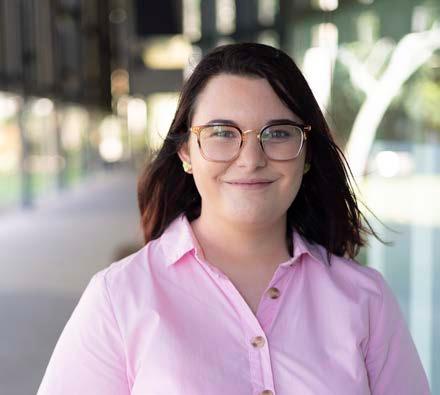
• Paediatrician
• Pathologist
• Rural Generalist
• Surgeon
“I would absolutely recommend studying Medicine at JCU. As a school leaver the program was ideal as it meant that I could go straight into a medicine course and reach my goals quicker than if I had pursued my dreams elsewhere. By completing more placement hours than any other university in Australia, I feel prepared to enter the workforce and that I can safely manage a variety of medical presentations independently."
Jessica Storrar
BACHELOR OF MEDICINE, BACHELOR OF SURGERY ALUMNI
Discover an exciting and challenging career providing quality healthcare for people with diverse needs in a range of community settings. At JCU you’ll have access to support services, fully equipped laboratories, simulated hospital wards and the benefits of a vibrant research culture.
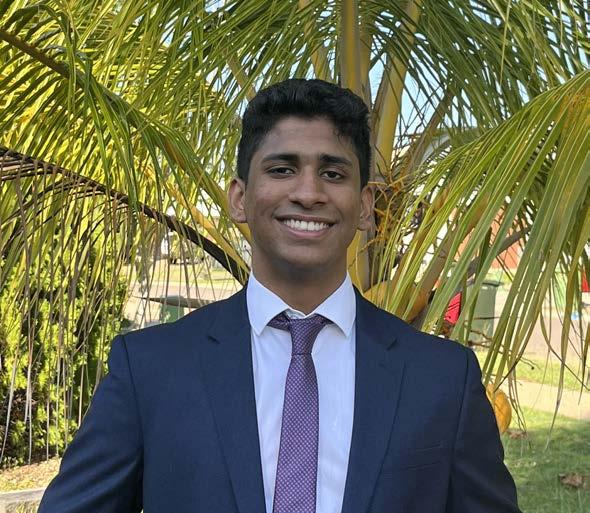
FEES: $7,344* | ATAR: 50 | ENTRY REQUIREMENTS: Australian Tertiary Admission Rank (ATAR) of 50 or equivalent
WHAT TO EXPECT
• Develop your academic knowledge of the science of nursing and your study skills in digital learning, mathematics and comprehension.
• Explore the foundational principles of communication and health sciences, nursing as a profession and effective methods for delivering culturally safe health care.
NEXT STEPS
• Graduate with a diploma or progress directly into JCU’s Bachelor of Nursing Science [Pre-Registration].
• A diploma qualification may enable you to apply for some non-registered health assistance roles, although most still require you to complete further study.
FEES: $5,810* | ATAR: 66 | ENTRY REQUIREMENTS: Recommended Knowledge: English (Units 3/4,C); Biology (Units 3/4,C); Chemistry (Units 3/4,C); One of General Maths, Mathematical Methods or Specialist Maths (Units 3/4,C)
WHAT TO EXPECT
• Develop your understanding of Indigenous health studies, law and ethics, working with vulnerable population groups, mental health and the Australian healthcare system.
• Benefit from extensive professional placement experience from your first year, helping people in rural, remote, tropical and Indigenous communities.
• Graduate ready to apply for professional registration as a Registered Nurse with the Nursing and Midwifery Board of Australia (NMBA).
CAREER OPPORTUNITIES
• General nurse
• Mental health nurse
• Oncology nurse
• Surgical nurse
• Aged care nurse
FEES: $5,800* | ATAR: 83 | ENTRY REQUIREMENTS: English (Units 3/4,C) Recommended Knowledge: Biology (Units 3/4,C); Chemistry (Units 3/4,C); One of General Maths, Mathematical Methods or Specialist Maths (Units 3/4,C)
WHAT TO EXPECT
• Apply your skills in culturally safe nursing, labour, birth and postnatal management to support women and their families through pregnancy, birth and into motherhood.
• Gain hands-on experience in JCU’s well-equipped clinical simulation laboratories and extensive professional placements at hospitals and health services in regional, rural and remote Queensland.
• Graduate ready to apply for professional registration as a Registered Nurse and Midwife with the Nursing and Midwifery Board of Australia (NMBA).
CAREER OPPORTUNITIES
• Midwife
• Paediatric nurse
• Emergency nurse
• Intensive care nurse
• Aero-medical nurse
“With a unique emphasis on rural and remote healthcare, JCU equips me for real-world challenges, making me confident in my abilities as a nursing student. The dedicated faculty and enriching community environment are crucial to my professional and personal growth, helping me become a competent and compassionate nurse.”
Jaise Jaimon
BACHELOR OF NURSING SCIENCE [PRE-REGISTRATION] STUDENT
Support individuals living with injuries or impairments to build the capabilities required for a variety of functions relating to self-care, work, school, play or leisure. Help them to participate more fully in the activities they need or want to occupy their daily lives.
#1 in Queensland for skills development
FEES: $8,710* | ATAR: 70 | ENTRY REQUIREMENTS: English (Units 3/4,C); One of Biology, Chemistry, Physics, Health, Physical Education or Psychology (Units 3/4,C)
WHAT TO EXPECT
• Discover contemporary therapeutic approaches to help people with a diverse range of health challenges to pursue their goals and interests.
• Expand your knowledge of human anatomy and physiology to understand the psychosocial, biomechanical, neurological and contextual determinants of occupation.
• Put theory into practice with 1,000 hours of professional placement experience in a range of healthcare facilities, including the JCU Health Occupational Therapy Clinic.
EMPLOYMENT SETTINGS
• Hospitals and clinics
• Aged care and home health services
• Private practices
• Mental health support
• Education services
Benefit from over 1,000 hours of professional placement
Discover the essential role pharmacists play in the health system, from bustling hospitals and pharmacies to clinics serving regional and remote communities. Help people to manage illness and disease through preventative healthcare strategies and optimal use of medicines.
Five stars
for median graduate salary
2024 Good Universities Guide, UG Pharmacy
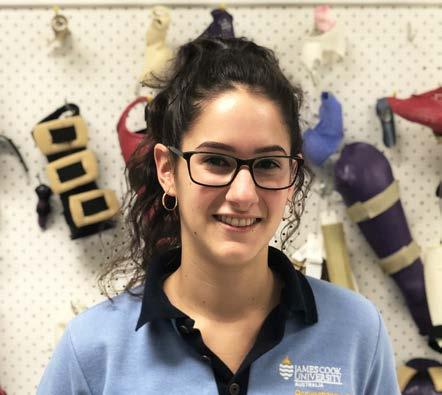
“Studying at JCU has provided me with so many valuable learning experiences that have expanded my knowledge and professional development. I love all that this degree has had to offer including the opportunity to complete my practical placements within rural and remote communities.”
Mackenzie Mete
BACHELOR OF OCCUPATIONAL THERAPY (HONOURS) STUDENT
#1 in Australia for learner engagement
#1 in Australia for student support
FEES: $9,314* | ATAR: 76 | ENTRY REQUIREMENTS: English (Units 3/4,C); General Mathematics (Units 3/4,C) Recommended Knowledge: Chemistry (Units 3/4,C)
WHAT TO EXPECT
• Study a comprehensive range of core subjects including chemistry, human anatomy, physiology, biology, pharmacology, therapeutics and research methodologies.
• Understand the medicines and treatments prescribed to manage and treat acute and chronic diseases. Learn to diagnose and prescribe treatments for common self-limiting conditions.
• Develop strong patient communication and clinical practice skills in over 600 hours of professional placements – the highest number of placement hours of any undergraduate pharmacy degree within Australia.
CAREER OPPORTUNITIES
• Community or hospital pharmacist
• Aged care pharmacist
• Pharmacist consultant
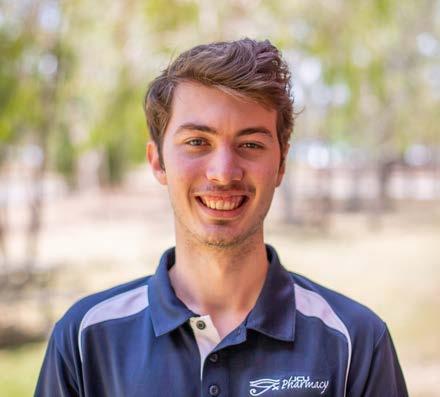
• Specialist roles in education, government and defence
• Industrial pharmacist
• Research
“Other universities don’t have the experiences and exposure we have and it shows when we graduate. I like the hands-on aspect –it’s different from being in the classroom. Experiencing it in real life builds on what you learn at uni. When you step into the real clinical world you get that full exposure to everything.”
Chris Simpson
BACHELOR OF PHARMACY ALUMNI
Become a health professional with the skills in physiotherapy practice to treat musculoskeletal and neurological health conditions. Develop the knowledge and confidence to improve the quality of life for people in rural, remote and Indigenous communities.
#1 in
FEES: $8,790* | ATAR: 89 | ENTRY REQUIREMENTS: Recommended Knowledge: English (Units 3/4,C); Mathematical Methods (Units 3/4,C); One of Biology, Chemistry, Physics, Health, Physical Education or Psychology (Units 3/4,C)
WHAT TO EXPECT
• Examine the key elements of anatomy, physiology and pathology to understand the human body and the impacts of illness, ageing, or injury on movement and function.
• Learn the fundamentals of physiotherapy practice and treatment techniques including massage, exercise prescription and related biomechanical principles.
• Gain hands-on clinical practice skills through 30 weeks of professional placement experience, including at the JCU Musculoskeletal Physiotherapy Clinic.
EMPLOYMENT SETTINGS
• Hospitals
• Private or general practice
• Rehabilitation centres
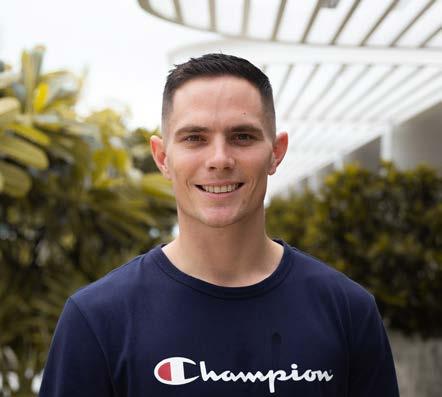
Psychological science is central to many professional disciplines including consumer research, health and welfare services, behavioural sciences and more. Continue your studies with postgraduate qualifications to pursue roles in clinical or professional psychology practice.
• Sports and exercise services
• Aged care services
“Studying physiotherapy at JCU is one of the most challenging yet rewarding experiences you can have at university. The exposure to practical skills and guidance from highly skilled educators are second to none. It’s an educational opportunity that is genuinely enjoyable and sparked my passion for physiotherapy.”
Wyatt Raymond BACHELOR OF PHYSIOTHERAPY ALUMNI
FEES: $11,060* | ATAR: 64 | ENTRY REQUIREMENTS: English (Units 3/4,C)
WHAT TO EXPECT
• Build a strong foundation in understanding human thoughts, emotions, and behaviour, preparing you for advanced study that can lead to professional registration or other career opportunities in psychology.
• Explore different areas in psychology, including social psychology, cognitive neuroscience, developmental psychology, environmental psychology, personality and counseling.
• Gain hands-on experience and professional insights through practical internship opportunities.
• A joint degree is also available with the Bachelor of Psychology. Combine Psychology with a Bachelor of Business.
CAREER OPPORTUNITIES
• Welfare support officer
• Guidance counsellor
• Research assistant
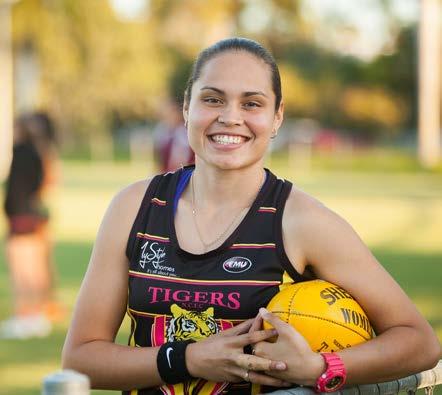
• Health services manager
• Social scientist
“I was impressed with the variety of subjects in the Bachelor of Psychological Science, including Forensic Psychology and Personality Psychology. My experience with Indigenous staff and peers has been a highlight and provided rewarding and culturally strong opportunities.”
Luana Healey
BACHELOR OF PSYCHOLOGICAL SCIENCE STUDENT
Kickstart your science career with hands-on learning in premier locations including the Great Barrier Reef, the Daintree Rainforest and dry savannahs of north Queensland. Use the power and extensive scope of science to discover innovative solutions to complex problems.
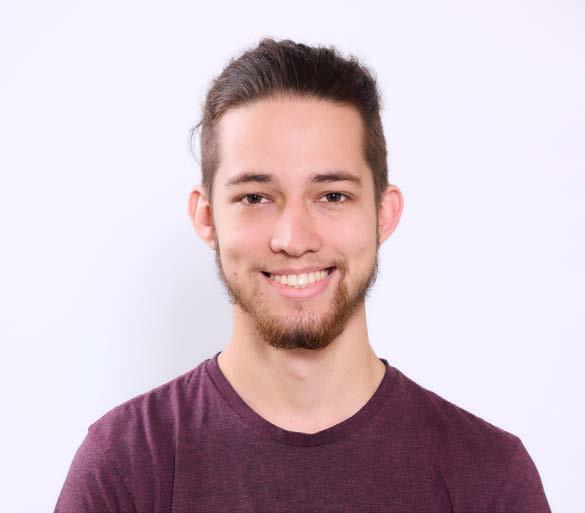
FEES: $7,800* | ATAR: 90 | ENTRY REQUIREMENTS: Mathematical Methods (Units 3/4,C)
Recommended Knowledge: English (Units 3/4,C); Chemistry (Units 3/4,C)
WHAT TO EXPECT
• Study advanced subjects in quantitative methods and mathematical techniques. Collect data and design testable hypotheses based on your findings.
• Develop a solid foundation of technical knowledge to advance your skills and the analytical thinking to critically appraise your work and the role of science.
• Apply your skills and knowledge to real-world research projects, complete field-based study in some majors and extend your handson learning with a research internship or practical placement.
MAJORS
• Aquaculture Science and Technology
• Chemistry
• Data Science
• Environmental Earth Science
• Geology
• Marine Biology
• Mathematics
• Molecular and Cell Biology
• Physics
• Zoology and Ecology
Refer to the Advanced Science and Science majors section for details.
FEES: $8,710* | ATAR: 66.5 | ENTRY REQUIREMENTS:
Recommended Knowledge: English (Units 3/4,C); Chemistry (Units 3/4,C); One of General Maths or Mathematical Methods (Units 3/4,C)
Note: Mathematical Methods preferred for Data Science, Mathematics and Physics majors
WHAT TO EXPECT
• Learn the fundamentals of science in your first year, then choose one or two majors to specialise in. Broaden your knowledge with a study minor or elective subjects.
• Gain the confidence to initiate and conduct research, with opportunities to design reliable, evidence-based studies. Consider the methods, techniques and tools used to support your investigations.
• Benefit from practical experience in laboratory classes, field-based studies in some majors and complete a professional placement or industry project in your final year.
• Joint degrees are also available with the Bachelor of Science. Combine Science with a Bachelor of Arts, Bachelor of Engineering or Bachelor of Laws.
MAJORS
• Aquaculture Science and Technology
• Chemistry
• Data Science
• Environmental Earth Science
• Geology
• Internet of Things
• Marine Biology
• Mathematics
• Molecular and Cell Biology
• Physics
• Zoology and Ecology
Refer to the Advanced Science and Science majors section for details.
“I have always loved the intricacies of the natural world and knew that I wanted to further my understanding as much as possible. At JCU, I especially enjoy the practical aspects of the degree. Going out into the field for hands-on learning has been instrumental in enhancing my comprehension of the theory in the course.”
Jim MacLean
BACHELOR OF SCIENCE STUDENT
Aquaculture Science and Technology
Explore the science behind large-scale production of aquatic species for food, aquarium, pearl and pharmaceutical applications. Learn about the approaches to support improved production including physiology, nutrition and diet optimisation, genetic selection and disease management. �
Chemistry
Available at James Cook University (Singapore Campus) in the Bachelor of Science only.
Explore the foundational role of chemistry in biology, earth and environmental sciences, biomedical and materials science. Learn about organic, inorganic, physical and analytical chemistry to develop crossdisciplinary capabilities and application methods. Accredited by the Royal Australian Chemical Institute (RACI).
Data Science
Experience the power of data visualisation, big data, machine learning and artificial intelligence. Mastermind database systems, programs, models and projects. Learn to develop algorithms and analyse patterns of activity in scenarios including urban planning, health services and crime prevention.
�
� Available at James Cook University (Singapore Campus) in the Bachelor of Science only
Environmental Earth Science
Examine the impacts of human development on the natural environment, particularly within climate, hydrology, biodiversity, soil quality and coastal catchments. Develop your skills in field work processes, data analysis, report writing and problem-solving in environmental management.
Geology
Discover the wonders of the Earth by studying geology. Uncover the processes that shape our planet, from melting rocks to shifting tectonic plates, and explore how our habitable planet has evolved over 4.6 billion years. Whether you’re fascinated by volcanoes, earthquakes, or the search for critical mineral resources, geology offers exciting opportunities in the field and lab to help protect our future. �
Discover the future of connectivity and the ever-expanding area of information technology and electronic engineering. Study microcontroller programming, electric circuits and circuit theory, sensor technologies and statistical data mining for big data.
�
Available in the Bachelor of Science only.
Marine Biology
Explore the critical challenges facing marine and coastal environments with access to one of the most diverse marine ecosystems in the world – the Great Barrier Reef. Study the ecology and evolutionary biology of marine life, the impact of humans on the marine environment and how the oceans and atmosphere interact.
Mathematics
Build problem-solving, analytical and quantitative reasoning skills, with an in-depth understanding of mathematical techniques, data analysis and multivariate statistical methods. Learn how to use mathematical models to illustrate science and engineering problems and the investigative techniques to find solutions.
Molecular and Cell Biology
Study the basis of health and disease at a molecular level and analyse the functions of a whole cell. Explore biochemistry, microbiology, biotechnology and bioinformatics to build an in-depth understanding of molecular genetics.
Physics
Explore some of the universe’s most challenging questions. Accredited by the Australian Institute of Physics, this major provides you with knowledge and skills across multiple physics disciplines.
Zoology and Ecology
Study the biology of plants and animals in their natural habitats and the impacts of deforestation, infrastructure expansion and other environmental factors. Explore biosecurity, behavioural ecology, conservation biology and ecological modelling to help conserve rare species, control pests and understand animal behaviour. �
Prepare to make a difference with the skills to bring people together and find equitable solutions to our most pressing social problems. Help identify the causes of suffering, fight for social justice, and improve the lives of people and communities.
Begin a life-changing career helping people who find it challenging to communicate with others or have difficulties eating and drinking. Develop specialist skills to work with children and adults through practical experience in JCU’s oncampus speech and language clinic.
#1 in Queensland for
FEES: $9,314* | ATAR: 62 | ENTRY REQUIREMENTS: English (Units 3/4,C)
WHAT TO EXPECT
• Gain the skills and knowledge to recognise and address critical issues surrounding human rights, social justice and environmental justice.
• Apply your theoretical knowledge during 1,000 hours of professional placements in your final two years.
• Deepen your understanding of the social, historical, cultural and political factors that influence people’s quality of life through optional field-based studies.
CAREER OPPORTUNITIES
• Social worker • Youth
• Child protection officer • Mental
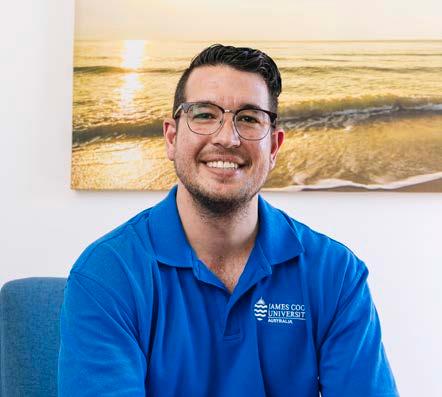
“JCU offers a Social Work curriculum that’s upto-date on national and international social change and development issues. There’s also the opportunity to put theory into practice during field placements."
Brodie Kuhn
BACHELOR OF SOCIAL WORK STUDENT
FEES: $9,720* | ATAR: 70 | ENTRY REQUIREMENTS: English (Units 3/4,C); One of Biology, Chemistry, Physics, Health or Psychology (Units 3/4,C)
WHAT TO EXPECT
• Learn to assess, diagnose and provide services to individuals, families and communities who experience challenges with communication and/or swallowing. This may include babies born with cleft palate, to children with developmental delays and adults who have experienced stroke or brain injury.
• Gain practical experience through professional placements in urban, regional and remote areas, giving you the skills to work in any setting.
• Develop your research capabilities as you conduct a research project relating to speech pathology during your final two years of the course.
CAREER OPPORTUNITIES
• Speech pathologist
• Rehabilitation team leader
• Mental health clinician
#1 in Queensland for
• Researcher
• Education services
• Private practice owner
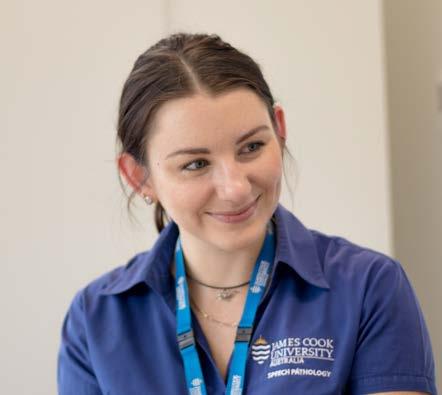
“Speech pathologists go through the human lifespan. You can get jobs in paediatrics — right from when babies are born — all the way through to palliative care. There are so many different places we can work, and we’re in really high demand, especially in rural areas.”
Nicole Dunn
BACHELOR OF SPEECH PATHOLOGY ALUMNI
Examine the science behind human movement to improve the quality of life for people with chronic conditions. Help athletes enhance their sporting performance or teach the next generation the importance of nutrition and exercise.
Make a difference in animal health and welfare with JCU’s emphasis on rural and tropical practice. Gain the skills to find solutions to complex problems and deliver safe and effective health care in diverse veterinary teams.
for student support and teaching quality
FEES: $13,240* | ATAR: 65 | ENTRY REQUIREMENTS: English (Units 3/4,C); General Mathematics (Units 3/4,C)
Recommended Knowledge: One of Biology, Health or Physical Education (Units 3/4,C)
WHAT TO EXPECT
• Learn how physical activity impacts human ability in areas including anatomy, strength and conditioning, nutrition, sports psychology and biomechanics.
• Gain practical experience through professional placement opportunities alongside industry professionals and in modern facilities including the JCU Performance Science Hub.
CAREER OPPORTUNITIES
• Sports and exercise scientist
• Exercise physiologist
• Performance analyst/coach
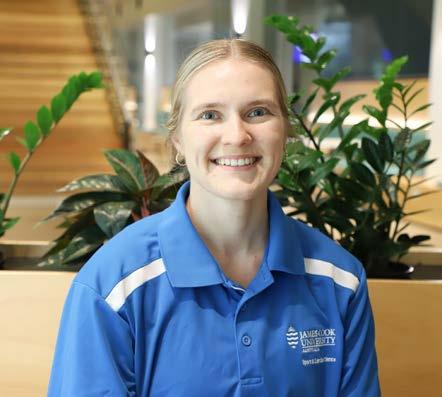
• Sport and recreation officer
• Wellness coordinator
• Clinical science technician
“I like the idea of getting a more in-depth understanding of concepts related to sport and exercise, and I’m thoroughly enjoying the face-to-face components of this course. The lecturers are very friendly, and they care deeply about helping us to succeed. The compulsory kindergarten placement was also very beneficial."
Kirsty Stevens BACHELOR
OF SPORT AND EXERCISE SCIENCE STUDENT
FEES: $11,920* | ATAR: Special Entry Requirements ENTRY REQUIREMENTS: English (Units 3/4,C); Mathematical Methods (Units 3/4,C); Chemistry (Units 3/4,C) Recommended Knowledge: Biology (Units 3/4,C)
WHAT TO EXPECT
• Develop the skills to diagnose, treat and prevent disease in a wide range of companion, production, aquatic and native animals. Manage solutions to complex problems using a One Health approach.
• Learn in JCU’s real-world teaching settings, including an on-campus veterinary hospital and a local working cattle station. Get hands-on with professional placements in both rural and urban settings.
• Discover how to improve the health status of animal populations and meet growing demands for sustainable animal farming methods.
CAREER OPPORTUNITIES
• Veterinarian
• Biosecurity scientist
• Veterinary pathologist
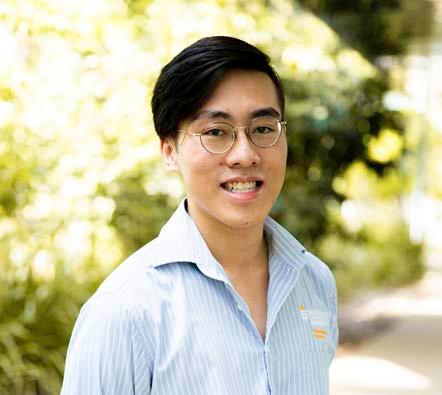
• Animal nutritionist
• Medical researcher
“I’d heard great things about JCU Veterinary Science’s practical, hands-on approach to teaching and decided that this was something I wanted to explore. The best part of the degree has definitely been all the places it has taken me. The rural focus really pushed me to explore parts of the country that I never would have otherwise travelled to. Providing me with placement opportunities from doing dairy medicine up north in the Atherton Tablelands to scoring rams in Warren NSW, this degree has given me an appreciation of the myriad possibilities there are for vet work in this country.”
Aaron Lau
BACHELOR OF VETERINARY SCIENCE ALUMNI
Once you’ve decided which course you wish to study, you can start the application process.
Applications for courses commencing in 2026 open in August 2025. Apply through Queensland Tertiary Admissions Centre (QTAC). You can choose up to six courses for your QTAC application, which you order according to your preference. Find out more about preferences at qtac.edu.au/preferences
Special deadlines/applications
The JCU courses listed below require an additional online application that you must submit online directly to JCU.
• Bachelor of Dental Surgery
• Bachelor of Medicine, Bachelor of Surgery*
• Bachelor of Veterinary Science
Application deadline: 30 September 2025
To access the JCU online application portal, please visit jcu.edu.au/academy/application-forms
*Shortlisted applicants are also required to attend an interview
YOUR OFFER
Once your application is assessed and approved, you’ll receive an offer via email.
Offers are made periodically in line with QTAC offer rounds. You can check the status of your application at qtac.edu.au/applications
Once you receive your offer:
1. Log in to your application at qtac.edu.au/applications
2. Accept your offer
3. Click on ‘Enrol at JCU Now’ to activate your offer 1.
Once you have accepted your offer, you can finalise your enrolment at jcu.edu.au/new-students
Explore the range of support services and learning resources, and to find helpful tips for your transition to uni, at jcu.edu.au/orientation
JCU advisors can guide you through your new student experience.
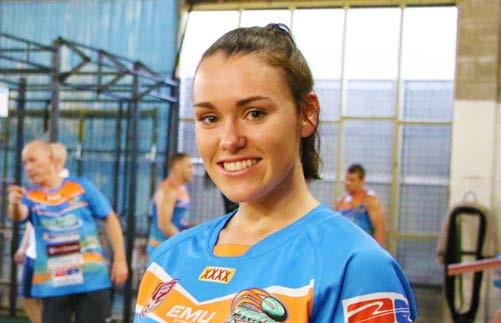
“I had completely forgotten how to study. However, I got through because the people and resources at JCU are so good. I had a wonderful mentor who inspired me to become a mentor as it helped me adjust so well. I always thought that JCU believed in my capabilities before I knew what I was capable of achieving.”
Laura Fewtrell BACHELOR OF SPORT AND EXERCISE SCIENCE ALUMNI
Most Australian domestic undergraduate students are eligible for a Commonwealth Supported Place (CSP). This means that your course fees are subsidised by the Australian Government and you pay a student contribution.
Course subjects are grouped by study area into four student contribution bands, which determine the fees payable for that subject. The total cost of your course will vary depending on the mix of subjects you complete and the year you complete them.
Eligible students in a CSP can defer payment of their student contribution to a HECS-HELP loan from the Australian Government. Your employer can process your loan repayments via the tax system once your income reaches an identified threshold. If you’re not eligible for a HECS-HELP loan, you’ll need to pay your fees by the census date for the relevant semester or trimester.
For details on contribution bands and fees visit jcu.edu.au/csp-fees
Estimated annual course fees for a full-time study load are on our course pages, which are searchable at jcu.edu.au/courses
The costs of providing non-academic support, services, facilities and events for students are funded by a Student Services and Amenities (SSA) Fee. Many of these are initiated and managed by student-led groups like the JCU Student Association.
Eligible students can request to defer payment of their SSA Fees with a SA- HELP loan from the Australian Government. This is different to a HECS-HELP loan for deferring course fees. Loan amounts are added to your accumulated HELP debt. If you’re not eligible for a SA-HELP loan, you’ll need to pay your fees by the census date for your course.
For more information visit jcu.edu.au/ssa-fee
OS-HELP loans are available from the Australian Government for eligible students in a CSP to study part of their course overseas. You must be selected by JCU to receive an OS-HELP loan and cannot receive more than two OS-HELP loans in total. Supplementary loans may also be available to study the local language in particular Asian countries. Loan amounts are added to your accumulated HELP debt.
For more information visit jcu.edu.au/os-help-loan
Full details of JCU’s course fees and financial support options are available at jcu.edu.au/fees
Learn more about the Australian Government’s HELP programs at studyassist.gov.au/help-loans
We recognise that many aspiring students face significant barriers when it comes to accessing tertiary education. That’s why JCU offers a broad range of scholarships, bursaries and grants to assist students with their study and living costs.
Many of these recognise academic excellence in particular study areas, while our equity scholarships provide support for students experiencing varying levels of disadvantage.
Government departments and industry groups also offer scholarships and financial support programs.
Find out more at jcu.edu.au/scholarships
May, Sept
May, Sept
311031 311039 - Jan, May, Sept Psychology Studies - 311031 - SG Jan, May, Sept Sociology 321031 311031 311039 - Jan, May, Sept
Biomedical Sciences
Majors:
Recommended Knowledge: Mathematical Methods,Chemistry; plus one of Biology, Health, Physical Education or Physics
Bachelor Degrees with Majors
Nursing Science (Pre-registration) Recommended
English, Biology, Chemistry; and one of General Maths, Mathematical Methods, or Specialists Maths
Knowledge: English, Chemistry, General Maths
Jan, Sept
Jan, Sept
for
Some compulsory on-campus attendance and clinical placement participation is required.
4 Some compulsory on-campus attendance is required for online students.
SER = Special entry requirements apply # = Meets rank but not some prerequisites. Please contact the JCU Student Centre for assistance.
* Estimated annual fee, plus Student Services and Amenities fee.
Interstate, International Baccalaureate (IB) and New Zealand QLD (from 2020)* QLD (up to and including 2019)*
Units 3&4 - Grade C or better 4 semesters at Sound Achievement (SA) or better Scaled Mark 129+ (50%+ in T Majors only*)
• English
• English and Literature Extension
• English as an additional language
• Literature
• Essential English (not for Education Courses)
• Queensland Senior External Examination
• General Mathematics
• English • English for ESL Learners
• English • English Literature
• Language and Literature
• World Literature
• ESL
• Mathematics A
• Mathematical Applications
• Mathematics Standard
Band
or higher (average of examination mark and school assessment)*
• English Standard
• English Advanced
• ESL
• EAL
• English Extension 1
• English Extension 2
• General Mathematics
• Mathematics Standard 2
• Mathematics in Society
• Mathematics in Practice
• Mathematics General 2
• English
• English Studies
• ESL
• English Communication
• English Literary Studies
• English as an Additional Language
• Essential English
• Quantitative Methods
• Mathematical Methods (up to 2016)
• General Mathematics
• English
• Literature
• Writer’s Workshop
• World Literature
• English Studies
• English Communications
• English Writing
• Mathematics Applied
• Mathematics Applied Senior Secondary 5C
• Mathematical MethodsFoundation
• General Mathematics
• English
• English (ESL)
• Literature
• English Language
• Further Mathematics
• General Mathematics
• English
• English (Stage 2 or 3)
• English for ESL Students
• English Literature
• Literature
• English Course
• English as an Additional Language or Dialect (Stage 3)
• Mathematics 1
• Mathematics IV
• Modelling with Mathematics
• Mathematics Stage 2C/D
• Mathematics Stage 3A/B
• Discrete Mathematics
• Mathematics Applications
• English A1 (HL or SL)
• English A2 (HL or SL)
• English B (HL or SL)
• English A: Language and Literature
• English A: Literature
• Mathematical Studies (SL)
• English
• Statistics and Modelling
• Statistics
• Mathematics
• Mathematical Methods
• Mathematics B
• Mathematics
• Specialist Mathematics
• Mathematical Methods
• Further Mathematics
• Mathematics 2 unit
• Mathematics (3U to 4U)
• Mathematics Advanced
• Mathematics Extension 1 and 2
• Mathematical Studies
• Mathematics 1
• Mathematical Methods (from 2017)
• Mathematics Methods Senior Secondary 5C
• Mathematics Methods
• Mathematics Stage 2 or 3
• Algebra and Geometry
• Analysis and Statistics
• Mathematics
• Mathematical Methods
• Pure Mathematics
• Calculus
• Applicable Mathematics
• Mathematics II
• Mathematics Stage 3C/D
• Mathematics Specialist
Stage 3A/B
• Mathematical Methods ATAR
• Mathematics (HL or SL)
• Mathematics Analysis and Approaches (HL or SL)
• Further Mathematics (SL or HL)
• Mathematics Applications and Interpretation (SL or HL)
• Calculus
• Specialist Mathematics
• Mathematics C
• Specialist Mathematics
• Mathematics Advanced Extended
• Mathematics (3U to 4U)
• Mathematics Extension 1 and 2
• Specialist Mathematics
• Mathematics 2
• Mathematics Specialist Senior Secondary 5C
• Mathematics Specialised
• Mathematics Stage 2 and 3
• Specialist Mathematics
• Applied Mathematics and MP/MQ Pure Mathematics
• Applicable Mathematics
• Mathematics III
• Mathematics Specialist Stage 3C/D
• Mathematics Specialist ATAR
• Mathematics (HL)
• Further Mathematics (HL)
• Mathematics Applications and Interpretations (HL) n/a
• Physics
• Physics
• Physics
• Electronics
• Chemistry
• Biology or
• Biological Sciences
• Chemistry
• Biology or • Biological Sciences
• Science (3U or 4U)
• Physics (2U)
• Physics
• Chemistry
• Biology
• Human Biology
• Biological Sciences
• Physics
• Science (3U or 4U)
• Chemistry (2U)
• Chemistry
• Biology (2U)
• Biology
• Chemistry
• Biology
• Physics
• Applied Science-Physical Sciences
• Physical Sciences
• Chemistry
• Biology
• Physics
• Physics
• Physical Science
• Physics (Stage 3)
• Chemistry
• Biology
• Chemistry
• Chemistry (Stage 3)
• Biology
• Human Biology
• Biological Sciences
• Human Biological Sciences
• Physics (HL or SL)
• Physical Science (HL)
• Phys Chem Sys (HL)
• Chemistry (HL or SL)
• Biology (HL or SL)
• Physics
• Chemistry
• Biology

Ready today for tomorrow